#you talk all the time about anti intellectualism on here and then share books by someone who's entire argument relies on strawmanning
Text
Ok it's probably going to get some people very mad at me but there's a massive difference between wanting people to respect those who are overweight or obese and blatantly ignoring the scientific method and literally everything medical science has been studying for decades.
Just because literal decades of well researched science says something you don't like doesn't mean it's wrong. It's just something you don't want to hear.
#seriously. i worry about you guys#you talk all the time about anti intellectualism on here and then share books by someone who's entire argument relies on strawmanning#lindo bacon can't provide genuine evidence to save their life and youd listen to them over hundreds of thousands of studies and#professinals who can provide solid data just because you dont like hearing what they have to say#listen. i love you guys and think you deserve to be taken seriously and not judged for your weight#but you're buying into a very dangerous mindset and i dont want to see you guys ruin your health because of these people#if you're overweight you're probably fine but obesity is wholly proven to lead to severe health issues in later life#yes even if you feel fine now#yes even if your bloodwork is fine now#you *can* make changes to your own life and your path#that should be inspiring. not 'its useless you cant change. give up!'#which is what people like lindo bacon literally say. verbatim.#would you rather exercise change in your life driven by yourself or be told by someone else you can never change what happens to you#anyway#tdlr seeing the name lindo bacon fucking shoots my blood pressure through the roof
6 notes
·
View notes
Note
I always see people who have never been antis, talking about/questioning how some antis even ARE antis when you look at their taste in media - ie the ever famous joke of "Hannigram is #problematique" "but it's a show where he eats people" or whatever.
I thought I'd weigh in as someone who could, hypothetically, be called an ex-anti (which, thankfully, nothing ever really came out of it - it was just very 2014 keyboardwarrior-esque behavior of me being a chronically online young adult who would share posts in a group chat making fun of certain shippers, or reblog posts about how 50shades is The Most Problematic Media Ever to exist -- basically I was an anti with anti-lines of thoughts, but i never, like, a ran a Shipping Discourse Blog or whatever)
For me, personally, it was a few different things. I can now see how it's incredibly hypocritical that teenaged me shipped Light/L, while still thinking that Dramione was Bad And Abusive. It ultimately boiled down to a) being pretentious, and b) just not understanding media or what proshippers REALLY believed, with a side of c) not realizing that nuance exists. like i was pretty late to join tumblr, I think I immigrated here during PEAK "yourfaveisproblematic" era which definitely did have an impact on my opinions and my tastes.
to elaborate, a.) being pretentious. i mean this one just kinda goes without saying. "I engage in media in a way more intellectual way than you do, don't you know that? You're a filthy and disgusting person who writes Snape/Hermione because you're an actually disgusting pedophile IRL who would probably date your own student that you're abusing if you could. Meanwhile, I'm a very smart, good, and pure person. When I read Uncle Vernon/Harry, I'm doing it in a G-d honoring whump way that clearly condemns abuse, incest, and rape. Unlike YOU who only writes harmful stuff as a way to get people off :/"
(as an aside, i think this line of thinking will ALWAYS be present in fandom and popculture in some way, sadly. ie the recent trend of people hating on booktok bc the books are 'trashy' and how these porn addicts should read real classic literature instead.)
as for b.), not understanding media - i cannot emphasize enough that i was GENUINELY stupid and disconnected enough to think that proshippers REALLY WERE pro-All Of The Degenerate Dead Doves That They Wrote.
why did i feel this way? why did i understand that Lolita clearly isnt pro-pedophilia, but for some reason i thought that someone shipping weecest was? well, first of all, i think that fanfiction is (generally) seen as Less Serious than classic literature, and fandom is a fun place, so i guess i somehow thought that every fanfic/fanartist who wrote Problematic Things, especially Problematic Things that they portrayed as Sexy, really DID enjoy the thought of that Actually Happening To Real People.
and i think THIS is the bulk of why antis ARE antis. i'm not calling them all stupid - i do think BEING an anti is stupid, but at the same time, there are people who are truly smart and good-intended people who just have some really off color opinions about, like, homestuck ships or whatever. Lawlight is okay because notebooks that kill people don't exist so it's IMPOSSIBLE for the Harmful Aspects of Light/L to be romanticized! but schoolyard prejudiced bullies DO exist and are a REAL problem so Drarry is BAD (*truly completely unaware of the fact that there's 'realistic' aspects of the Light/L dynamic and 'unrealistic' aspects of Drarry - such as, for example, Hogwarts arguably being even MORE of a fantasy setting than DN is.*) I know that media literacy is the hot buzzword of the year to throw around in 2024, but, like, i really did not have media literacy.
as for c.), not realizing nuance exists - ok "nuance" might not be the best word here, but i dont know how else to describe it. like, each time ive typed the word "problematic" out in this ask, i've done so in a very tongue in cheek/ironic/retroactive way, but, like, those posts about how Everything Is Problematic, Including Your Fave ARE true. and i didn't like the fact that my favorite media or favorite person might've Made A Mistake! i need to Talk About Its Issues Because I'm So Betrayed That My Dear Sweet Comfort Media Would Do This To Me. I Need To Prove I Clearly Condemn It.
like, i legit morally could not justify reblogging a twilight post without adding in the tags '#this is my guilty pleasure it sucks that the books were so racist though' or whatever. Most people were lucky enough to avoid that line of thinking, but there was an actual group of people who felt a genuine need to virtue signal all the time, partly bc, hey, they WERE passionate about talking abt #issues in media, but also bc of a subconscious fear of If You Reblog A Singular Piece Of Hetalia Fanart, You're Literally A Nazi And Will Get A Callout Post Written About You.
and during all of this i was at the tail end of my high school experience (yes i know im younger than most of your audience, ha). i was going through A Lot emotionally, going through a lot of life changes, and lived in a very . . . interesting household/place where i couldn't do ACTUAL good in the world that i was passionate about. so to make up for the fact that i was genuinely in no place to do legit activism, clearly i had to save the gay community by arguing about johnlock queerbaiting or whatever.
^ and honestly i do think that is the position of most antis. theyre isolated and cant seem to do Enough in the Real Scary World so they have to resort to talking about how bad of a person someone is for "shipping abuse", bc theyre not in a situation where they could, for example, ACTUALLY fight the good fight to end abuse or raise awareness for it.
There was way more to it and way more that I could say, if I wanted to, but this post is long enough as it is and probably doesn't make much sense.
I feel bad for antis, honestly, or at least the ones who are antis in the way I used to be.
--
Oh yes, passionate young fools who think they can at least fix the internet if not their lives make up most of the cannon fodder. Some of the ringleaders are just mini dictators and wannabe cult leaders, but most anti-leaning types are just traumatized or clueless, even a lot of the ones who do serious damage and don't just mock shit in private with their friends.
126 notes
·
View notes
Text
BLOGGIES 2023 REVIEW WINNERS

Week four of BLOGGIES month has ended. Soon there will be a four-way free-for-all, where GOLD winners in each of the four category brackets will vie for BEST BLOG POST OF 2023!!!
But first: your winners of the REVIEW category, their medals, and acceptance speeches!
(I asked these designer-critics for some thoughts about their winning entries, and where they think we in TTRPGs are going.)
+++
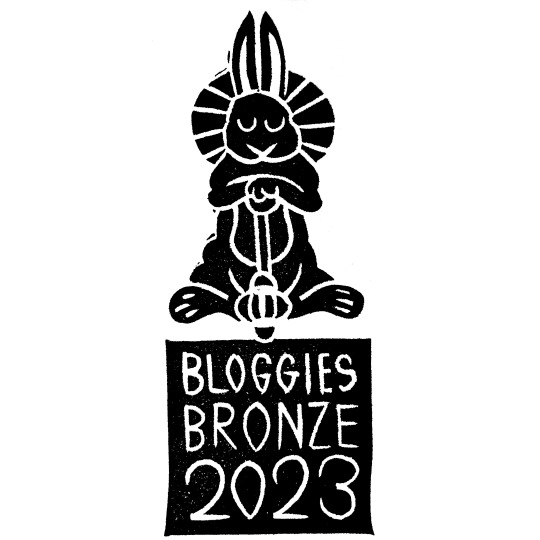
BRONZE BLOGGIE FOR REVIEW POST:
🥉MICROBLOG: CHILDREN’S BOOKS AND TABLETOP GAMES🥉
from FAIL FORWARD
Sandro:
Firstly I'd like to thank anyone who thought it was a good idea to give me an award of any kind. It's humbling and bewildering and y'all are the best.
This was a just-for-funsies lunch time blog post that almost didn't happen. It was inspired by carefully listening to folks much wiser than me talk about what makes them tick. (Often times I think people's aspirations can tell us a lot about what their origins and inspirations might be) Yet here we are, an award winning post! Let this be a testament that it's always better to put yourself out there because you never know what people will resonate with!
I'd like dedicate this award to children big and small, in and out of homes of all shapes and sizes. The suffering so many kids endure is heartbreaking, so if you take anything from this little speech let it be this: Be kind to the next generation. What we pass down to the young readers of today shapes the writers of tomorrow. No pressure ~
+++
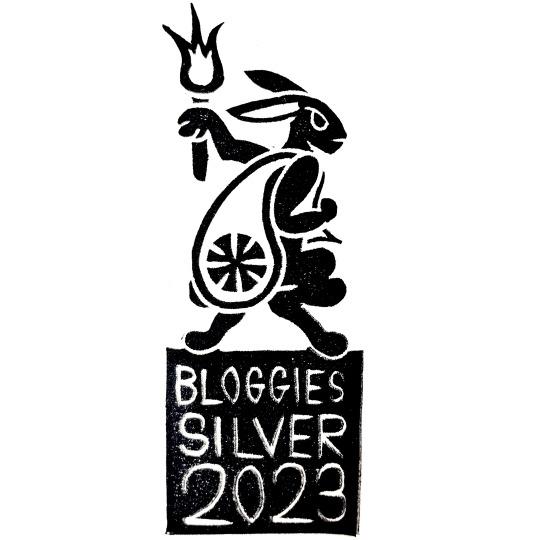
SILVER BLOGGIE FOR REVIEW POST:
🥈Plagiarism in Unconquered (2022)🥈
from Traverse Fantasy
Marcia:
I am so happy that Ènziramire’s excellent critique of The Mwangi Expanse won first place for reviews this year, for three reasons. First, because he is a wonderful friend and I am so excited to celebrate his successes. Second, because his critique is such an insightful application of historical materialist and anti-colonial theory to the realm of tabletop game literature, above all the rest deserving first place. Third, I’m upset that my “review” was nominated and voted for to such a degree over other bloggers’ more deserving work as well as over my own actual reviews and critiques. Being nominated for a long-form call-out post, and it being treated as a significant accomplishment on my part, feels gross. Someone had to write it, but all it had to be was over and done with. It did not, and should not, need to be celebrated. I’m very glad that an actual review, especially one so cohesive and incisive, won in the end. Congratulations, Ènziramire!!
As for the content of the post itself, here's my final word on it: if you're going to commercialize your work, commercialize YOUR work. My constant emphasis on the distinction between copyright infringement and plagiarism is more than pedantic: it's the difference between disrespecting intellectual property (about which, who cares!) versus privatizing the work of others. Going forward, sure, we should work towards a better culture of creative attribution, but we should also work towards non-commercial interactions with our hobby. Pseudo-Paul says, "The love of money is the root of all evil", and it's difficult not to see the constant grind of commercial publishing and social engagement as responsible for this incident. Isn't an ideal creative culture not just an attributive one, but a free and accessible one disentangled from the demands of capital (even if expressed through our particular needs)? We should attribute generously, but we should also share freely as well. From each according to their ability, to each according to their need!
+++

(In lieu of a medal, Gold winners will get a linocut print; here’s a design inspired by Ènziramire's post & Christina Sharpe's In The Wake: On Blackness and Being---a dragon and her wake. )
GOLD BLOGGIE FOR REVIEW POST:
🥇An Empty Africa - PF2E's The Mwangi Expanse and the strange career of Black Atlanticism🥇
from A Most Majestic Fly Whisk
Ènziramire:
"An Empty Africa" was, if you’ll forgive the joke, written in a spirit of homecoming. Pathfinder was my first tabletop RPG and the frustrations with bourgeois Afrodiasporic creative spaces expressed in the post are the same exact ones that compelled me to make a blog in the first place. The post’s reception in those same Black spaces has been varied but the most important conversations about it that I’ve participated in have been characterized by a kind of low level nervousness. What does trans-Atlantic intimacy and community look like if many of the ‘natural’ connections between Black folks we take for granted are actually expressions of Afrodiasporic supremacy? Is the desire to feel wounds together (with the Middle Passage as the ur-wound) inherently imperial? There's nothing wrong with a bit of healthy concern, but a perspective on diaspora that includes and inscribes Africa as a constitutive locus (as opposed to a static source for diasporic self-invention) is one that opens up passages. It’s trendy to say that the politics of Afrodiasporic relation, real capital-P Pan-Africanism, ‘dies’ in the 20th century bc a solidarity of shared suffering is somehow false or limited. Fuck that. Solidarity between people going through it is just one basis for affiliation, but it’s a basis that continues to demonstrate its power and relevance. South Africa and Palestine, average Chadians rescuing Darfuris targeted by genocidal militias in Sudan, Rwandan activists risking prison or worse to protest their government’s role in the bloodletting in the Kivus, mutual support networks linking queer Ugandans and Namibians together, and so much more. My father, himself a stubborn old pan-Africanist from Somalia's "born-free" generation, is fond of saying that the experiences with racial capitalism which make immigrant Africans Black are blessings if you read them backward; mourning together gives you new kinfolk.
My advice for people with similar fears: don’t let liberal constructions of identity constrain your love. The part of you that wants to be caught up in the emotional worlds of cultural Others—what Glissant might call the entangled co-creation of selves, “unities whose interdependent variances jointly piece together the interactive totality”—is something to be cherished and scholars of Black music have noted that serious play allows us to explore forms of diasporic belonging that respond to difference with joy instead of masking it behind strategic essentialism. Africa should be more than an object of retrospective rediscovery, yes, but genuine familiarity is the most potent weapon we have to combat that tendency. Anyone insisting that this work, learning to reflect each other more honestly, must be restricted to (nebulously defined) 'people of African descent' for it to matter is an idiot or a huckster. We’ll fuck up, but that's family, yeah?
Thanks for reading, y'all.
+++
Thank you, TTRPG family!
(Special thanks to Martin / Sharkbomb for his assistance tidying up the medal graphics.)
20 notes
·
View notes
Note
Since Dipper is the one most likely to get backstory out of Bill, did he ever come across Flatland (as in, the book)?
Dipper's the one most likely to ask the questions that get the terrifying answers that Bill doesn't realize reveal a bit too much; but I think Bill would more freely share dry unemotional biographical details . He's already told Ford he comes from the second dimension, and he mentions Edwin Abbot Abbot when asked in the out-of-canon AMA about his origin—so I think it doesn't take much prying for him to describe where he comes from. (And in an earlier ask about this AU, I cracked a joke about him cheating at cards to coerce the family into watching Flatland for movie night.)
All of which is to say, I'm sure Dipper knows about the book Flatland—Bill's probably name dropped it—but to everyone's surprise except Bill's, it's Mabel who actually sits down and reads it first. By the time Dipper gets a crack at the book, Mabel's made a shapesona.

(This is Mabel's shapesona. Bill calls it the most hideously disfigured man he's ever seen.)
Keeping with the theme I've got going here of "Bill and Mabel are actually scarily alike and the more they notice that the more they get invested in figuring each other out": Bill is Mabel's new terrifying friend who might destroy reality, but is pretty fun when he isn't doing that or hurting her family, and MAYBE he could be talked out of wanting to do that at all! She wants to know where he came from and what made him the way he is. Dipper is driven by academic curiosity and a need to understand his enemy, but Mabel is driven by the 🌈🌟POWER OF FRIENDSHIP🦄💞!!!
So yeah she'll jump on this dry hundred-something-year-old book about MATH just to learn a bit more about Bill.
The first the rest of the household learns she's picked up the book is when she stomps into the kitchen in her pajamas ready to RIOT because the Flatlanders banned colors. "That's like banning fashion! Or HAPPINESS!"
(Bill reassures her that the book's mostly satire and color was legal in his dimension. "And anyway, they're all dead now!")
Dipper picks up the book the second Mabel finishes it. He probably gets a bit more out of the mathematical thought-experiment side of it, but not by a whole lot; Mabel might not be a nerd but she is smart, and most of the math concepts explained in the book are the kind of thing they're about to hit in school in anyway.
Mabel connects more to the story emotionally. Dipper interacts with the 1D King's disbelief of the 2nd dimension with the understanding that it's a metaphor to help a 3D reader grapple with their own disbelief of the 4th dimension, but Mabel interacts with it on the level of "the point king is stupid not to believe in lines, the line king is stupid not to believe in squares, the squares are stupid not to believe in spheres, and the sphere is stupid not to believe in 4D shapes!!" (Bill, deeply amused: "YEAH, YOU TELL 'EM, SWEATERS!")
Of course, Ford's read Flatland too, decades ago. He and Dipper can talk in depth about the mathematical concepts (which Dipper appreciates, because watching Mabel go on with Bill about the social side of the book is making him feel pretty left out). Ford helps explain some of the geometric concepts that are a bit beyond Dipper's 13-year-old education, and talks about his own personal experiences trying to interact with higher and lower dimensions—which are all a lot messier than the book would suggest.
But at night when the adults (and alien) aren't around, Dipper and Mabel have quiet conversations about the politics in the book—the sexism, the classism, the... shape-ism? the anti-intellectualism, the political imprisonments, the medical mutilations, the infanticide, the tyranny... And they wonder how much of it is just a human's fiction to make an interesting sci-fi book, and how much really does describe the world Bill came from.
Stan hasn't read the book and fell asleep during the movie.
#bill cipher#mabel pines#dipper pines#gravity falls#gravity falls fanart#bill goldilocks cipher#shape gender
90 notes
·
View notes
Note
I will always defend book Armand over this weirdass retcon and I'm a Muslim. Let them have their cake and eat it all, they support girls being raped, they support extreme DV, they support a Lestat that doesn't resemble any version of any Lestat known to man, I hope they drown in their feels. Leaves more room for the intelligent chatter to have adult conversations. The show has nothing to do with the VC universe except hypocrites.
I mean... I'm Muslim too, born and raised. I don't even know how this became an issue. I make a few posts this morning and suddenly I'm a racist and a pedo for wanting to see my favourite character in some sort of canon-like depiction. Like, damn. Now, I've lived my life and I have a thick skin but it's hilarious to me how this is essentially JA!Louis all over again.
It's such an anti-intellectual straw man argument to level against perfect strangers because they don't share your fandoms opinions. How does that truly negate anything I said and how am I supposed to respond to that? Sorry, I actually experienced rampant Islamophobia growing up visibly Muslim in post-9/11 New York. My real name is as Arab as you could possibly get, the TSA loves me. Me sharing my opinions on a casting choice for a crappy show on tumblr dot com is not racism or xenophobia, I'm sorry to tell you.
Me being upset about Armand's casting has nothing to with Assad Zaman. I would love to see more queer Muslim rep! It's an issue I've cared about since I was young, since it obviously affects my community directly. And I've said several times Rashid would be great as his own character! The absolute circles I have talked around myself to try to articulate my own opinions on my own blog every time it's come up in the past so I won't upset anyone... frankly, it's ridiculous.
And yes, the hypocrisy between people bitching about us Armand fans while wholeheartedly supporting the changes made to Claudia's character is unbelievable. Clearly, it's fine that Claudia in a "14-year-old's body" talks about sex all the times and is raped off-screen. It's fine she demands of her guardians, "Which one of you is gonna fuck me?!" and etc. This never happened in text, this is AMC creating problems that didn't exist. Not two weeks ago the same people were like "Oh, what if they're merging Claudia and Armand's stories together??"
So it's fine as long as they're getting what they want, that's the tl; dr of it all. This show pulled in less than half a million cable viewers last weekend, alright? It's really not that serious outside of our super nerd fandom spaces. It's not the successor to The Walking Dead AMC hoped it would be.
I don't talk about my religion a lot because this is a fandom blog, not a personal one. And I don't buy into the nonsense of having to reveal my private life in order to lend credibility to my opinions on a platform of strangers. I'm not going to list off my entire life history in the hope some randoms will take me seriously about vampires. And why would I share anything with people who behave like this?
But I do mention it in passing here and there and it is common knowledge to my fandom friends (Rashid praying was a fun time in the chat), so I don't want you to feel alone, anon. ❤️
#tumblr you are so very predictable#but that said i usually have a great time over here in armandblr <333#just so you know <33333#you ask and hekate answers#vc
60 notes
·
View notes
Text

Note: I've linked StoryGraph summaries of every book to each title.
Glory and the Master of Shadows by Grace Callaway: This is my third consecutive month of screaming about Grace (0 shame btw). First and foremost, I deeply appreciated this book for touching on the Opium Wars and the atrocities wreaked on China by Britain, and how the government was complicit.
Wei is one of those uber-competent heroes who isn't outwardly a mess (like many a Grace hero lol). Like, in one night, he saves Glory from falling off a drain pipe, goes down on her (which... her mom may or may not have unwittingly overheard but tbh Maggie does not have a leg to stand on), and fixes the drain pipe before leaving. Truly a prince among men. That being said, his trauma runs deep to the point where his life is solely focused on revenge, which is why Glory is such a shock to his system. Wei and Glory's dynamic is just adorable: A heavy dash of teacher/student, along with a really deep shared understanding between them about what makes the other tick, and not just because of commonalities in cultural background. Like, Wei appreciates Glory for the very qualities that make her a bit of an awkward turtle in society.
Plus, it's always fun to read about previous Grace heroes and heroines. The Charlie's Angels gals' friendship is going strong, even if Glory initially feels a little off about being the only unmarried one in their group. Fiona does the modern equivalent of giving Glory a slutty makeover to seduce her crush. Rhys (the heroine's formerly slutty dad) is now a Serious Politician who is sponsoring an anti-opium bill. Hawk apparently has sympathy pains during Fiona's pregnancy. Gavin Hunt is so excited about possibly having a grandson named after him he makes the kid engraved jewelry before they're born. I love this gang.
Caitlin Crews
I wanted to get into some of my Harlequin recs this month, but when I made a list, I realized maybe one author a month would be better. So let's talk about Caitlin Crews. What I love about her writing style is that she's not afraid to make you dislike both the heroes and heroines a little (or a lot). It's easy to write a hero who is The Worst but then you eventually come around to him, but a winning formula is writing a hero who scares you a little and pisses you off a lot, and then a heroine who annoys you almost equally. But in a good way, for both. The dialogue is also always, always on point.
The sex Caitlin writes feels... borderline transcendent? Like you read that shit and think "this is not attainable" and then happily go back to reading more. Here are some of her books I'd rec:
The Viking's Runaway Concubine
The only Harlequin Historical I'll recommend, and only because I was terrified for most of it during my first read. Terrified but enthralled. It's set in Viking-ruled Britain in a time where slavery was practiced. There's an M/s dynamic to Ulfric and Eithine's relationship except, Ethine is Ulfric's literal slave as well. Do we see where the lines of consent are blurred?
But here's the thing: The sex is hot. It's very hot. Ulfric is obsessed with finding Ethine after she ran away from him, and her punishment for her "transgressions" once she's found is written brilliantly. He's also, in general, obsessed with her. He's all "you might as well have stabbed me in the HEART instead of slashing my face when you left meeee". On top of that, Ethine's whole inner conflict is that she *shouldn't* find pleasure in the pain he gives her, so she tries to convince herself she's being forced to take it. There's a looooot of conversations between Ulfric and Ethine about consent and gender roles so the book actually keeps you on your toes on like, an intellectual level lol.
Claimed in the Italian's Castle
A modern retelling of Beauty and the Beast. Angelina is practically sold off by her weirdly feudal family to the "Butcher of Castello Nero", Benedetto Franceschi, a man whose past 6 wives have all died under mysterious circumstances. Regardless, he gets Angelina off at her piano several dozen times so she does what any smart gal should do and agrees to marry him. By the time we hit the climax (the emotional climax; not the sexual one) I remembered why I loved this book, namely, how a so-called boogeyman (he's so self-loathing that he looooves thinking of himself as a boogeyman) is reduced to a sopping wet pathetic mess on his knees. There's a winner right there.
Just One More Night
The last 3 books are Harlequin Dare books, which have sadly stopped being published, but here are my favorites:
Speaking of heroines that irritate me, let's talk about Indiana 'Indy' March: She's a free spirit (but in a self-sustainable way) who does what she wants, walks away when things get too intense, and says shit like "Ambition is for people who don't like what they have. But I do", causing my poor little capitalist heart to go "nooooooo".
Anyway, it's interesting because for a woman who doesn't like being tied down, she voluntarily goes to meet a man she accidentally walked in on like, assassinating people in a random alleyway in Budapest and then IMMEDIATELY proceeded to have sex with said man, Stefan (and when she says they didn't use a condom, he says the seminal masterpiece of a line "you American girls are always on the pill"). And now, two years later, she's back to meet him at a time and place designated by him, and it goes from there. He does, at some point refer to her pussy as "one of the great wonders of the world". Out loud.
Teach Me
This one has your classic Caitlin bratty heroine— Erika— who gatecrashes a sex club to try and hook up with her brother's best friend Dorian (yes, bear with me— his name is the least hottest thing about him). This man tries to scare her away by delivering a spanking but like, she's obviously very into it. He then proceeds to dom her into being less self-sabotage-y and coaches her through her mommy issues, which I thought was cool of him. Would recommend.
The Risk
The stripper-ballerina book. Literally. She's a ballerina who wants to let loose so she gets into an exclusive club to do a burlesque routine, and then a man buys her (time) for the night for anonymous sex. Not a lot going on tbh, just really well-written, evocative stuff. Like at some point during sex, she's wearing the wings from her routine and nothing else which I thought was hella cool.
#trivia's book round-up#grace callaway#caitlin crews#harlequin dare#harlequin presents#historical romance#contemporary romance#harlequin#book recs
6 notes
·
View notes
Text
youtube
"...I don't know if it was about that it was time, I think it was just that Chris had been - I asked him recently; I'd never asked him during the shoot, and I said: "Why did you want to write it?" And he said he was really taken with the idea that there was a close to zero chance that they would blow up the world, but not a zero chance. That when they did the Trinity Test, it was close to zero, but not fully zero, and I think he said: "What's that conversation like? What, what does that look like? What's that decision to potentially destroy the world in order to try and save it?" And he just thought the theme was so huge and yeah..."
"...Kitty is not a natural nurturer...so probably not meant to be a mother so I guess I had empathy for that. This is a woman who was meant for, you know, exciting, intellectual endeavours; she was a scientist and she was a non-conformer, she didn't want to contort herself into the 1950's feminine ideal, and thus got the reputation as not being terribly nice, you know - but I bet she was not happy a lot of the time, and I had empathy for that. Someone who went to waste at the ironing board; I thought that was a very complicated character, and she was fiery - she was a huge presence in his life and a huge supporter of him. Yeah, yeah - I loved playing her."
"...there's nothing unintentional in Chris; we talked about Groves being accessible, like a - like, you know, to give the audience some access and, and, and laugh or two. But you know, that relationship was very well documented and, and you know, there was this natural tension between the military and the scientists because the military is all need-to-know and compartmentalization, and the scientists take the opposite approach, which is, you know, share all your information so we can get to the truth - and so, so it was, it was a really fun, you know, it was really fun to play because there was this natural tension."
"Well when you think of what's at stake too, right? Like, it's incredible how consequential this was, right - this is the biggest thing to happen in the twentieth century, and he's trying to run this project and, and, you know, and with this fear that, that there's espionage, that there's - you know; you know a lot of the scientists were suspected Communists or potent - you know, they had been to meetings because they're, you know, earlier on, you know, with, with Franco and Spain, a lot of them were sending money to the, to the rebels and it was like, you know, to fight fasc - they were anti-fascists but...his job is not to trust anybody; just assume that everybody is a spy and that everybody's trying to get this information and then obviously, if it falls into the wrong hands, that would be cataclysmic so there was a lot at stake."
"...when Chris came to, to talk to me about the movie, he bumped into John in the lobby, and he already knew that he was gonna go to Emily, but he didn't want to do it on the same day because he didn't want it to seem like he was going to just one apartment building to cast his movie."
"He didn't - he thought it would be offensive to me if it seemed like convenient casting, you know, that he was like: "Oh, while I'm here...""
"...yeah so - but he knew that - the cast that he wanted, but he didn't want -"
"He's incredible, and by the way, that's by, like design - like Chris knew the whole time; he said: "I'm gonna call it Oppenheimer - I'm not gonna call it 'American Prometheus' which is the name of the book, because it's so important that it's really his guy's subjective experience." The whole movie he said is gonna ride with Cillian like, and so he goes: "I'm putting this entire thing on his back.""
"He's so mesmerizing, like mesmerizing, and it was a monumental task to take on like; I don't know how he retained that - the storm of this movie - for so long and he's mesmerizing like, what he was able to play in the duality of that character in every moment, it's so good; I'm so happy for him."
"It's, it's an awesome performance yeah; it is like, it is as good as they come."
"One of the greats of all time."
1 note
·
View note
Text
Here goes nothing...
As Twitter is in flames, TikTok has become a waste land, Instagram is awkward, and new apps want my attention, I feel the need to pull back from it all. I no longer want to participate in [for time and tangents that we’ve heard a million times before] social media discourse and false intellectual conversations. Not to say I don't love a good trash talk, but the current state of things need new perspective.
There is a new attack daily on the rights and lives of marginalized people. It feels as though we are just finding out that we are a year into a war that only one side knew was happening. It's hard trying to share the information and move past social media activism. Stories of articles unread, and captioned outrage do nothing when the phone is locked. Hell even to accounts that don't follow you, it does nothing. I am not above this either. I haven't found any local movements to join, outreach programs to partner with, nor mutual aids to fund. I’ve built a bad habit of complaining with my thumbs and not with my actions.
What will make us angry enough to leave our comfort? What will horrify us enough to respond to the violence we’ve learned to endure. We need to get learned and quickly. We need to educate our people on the truth and unlearn the false histories written to erase and/or villainies us.
Leaving social media will hopefully free my mind of unnecessary distractions, to strategize, learn, and create. I have made it a point to read more (especially books on black anti capitalism and black feminism) and learn more about my passions (fashion, art, music, community, black-ness, anti-capitalism) and more about things I don't know about (other cultures, infrastructures, idk cause idk). It's important to learn and read and study the things you want to be involved in. As I learn and develop understanding around topics, I want to strategize ways to enhance the lives of black people in my community and globally.
Though my primary focus is on black people and indigenous people’s advancement, I understand that the only way to liberation is for us all to be liberated. And liberated we will be some day. I believe that. May grace find us when we need it. May love keep the fire burning. Normal people create the revolution, not great heroes, we must be our own heroes! Change is gradual, and will take place overtime, as long as we are willing to fight for it.
-J
Im not proof reading so.
0 notes
Note
I am a queer Catholic (since infancy). In my region the dispensation that said attending Sunday mass was optional during the pandemic is ending in early June. Being away from mass for over a year has led me to a point where I'm not sure I can go back but the reason I still consider myself Catholic is a constant draw toward the eucharist/the doctrine of transubstantiation/the Real Presence. (multi part ask, will sign as Bread Anon)
The Eucharist is the reason I would go back, because I don’t know of any other denomination that shares the doctrine of transubstantiation. Or maybe they do and I was just taught that only Catholic consecration actually was effective? I’m feeling frustrated because I want to be part of a queer and expansive God-seeking community, but there is no way my local Catholic parish can be part of that. But I still want the Eucharist. (Bread Anon 2 of 5)
To me there’s something so visceral, physical, carnal, expansive, abundant about it that even if it is a Mystery in many ways to me, I don’t want to let it go. I also am feeling frustrated because the reason my politics are as focused on care and inclusion as they are is *because* of my Catholic upbringing, but in my region all I see now is obsession with being anti-choice, anti-sex, anti-divorce, trying to convert people, and being nice, law-abiding citizens. (Bread Anon 3 of 5)
For months before the pandemic I was only coping with mass by leaving the sanctuary during the homily and reading queer-inclusive theology on my phone until it was over (I stood by the church’s lost and found bin for this, which I had to laugh at as a rather heavy-handed metaphor). I’m looking for any advice you have about going back or not going back, whether the Real Presence can be exclusive to a church I am so frustrated with, (Bread Anon 4 of 5)
and how to address the feeling of danger I have that missing mass on Sunday is an insta-hell sin if I randomly die. (For the record, my intellectual position on hell is that a God worth worshipping must be more compassionate than I am, and I would not condemn anyone to eternal torture no matter what they’d done. But worries of mortal sin are deeply installed buttons.) (Bread Anon 5 of 5)
____________________________
Whew, anon, I feel all this so deeply. I also grew up Catholic and deeply love Catholicism, particularly its beliefs around the Eucharist (as well as Saints, Mary stuff, and the deuterocanonical books of the Bible).
Deciding to seek out a different denomination was a really hard choice, but I am grateful I finally did. I now retain what is most dear from my Catholic roots, while having expanded into an affirming tradition as well.
Eucharist:
I recommend looking into the ECLA (Lutherans) and Episcopal Church for traditions with very similar views around the Eucharist. (I’ve heard some people say that apart from a couple places where liturgy diverges, they can hardly tell a Catholic Mass and Episcopal service apart!)
I believe that “consubstantiation” rather than “transubstantiation” is the term for Lutheran views, but look into it and you’ll see the similarities! Both Lutherans and Episcopalians very much uphold the Real Presence of Christ within the Eucharist.
(...Unlike in my own denomination, the PCUSA, which has a very “low” view of the Eucharist as “only” “sign and symbol.” That was a big struggle for me for a while. But I have come to appreciate the diversity of beliefs around communion as much as around just about anything else you can name across Christianity. I have a post about my journey in this regard here. I also have a poem celebrating the differences.)
__________
Addressing fears and finding nourishment:
I totally feel you on believing one thing to be true (like God not sending people to hell) and still having that deeply ingrained fear. That’s something that will take a long time to uproot, as I’m sure you realize.
I’m not sure I can be the best help to you beyond letting you know that’s totally normal -- you might just need time, or you might need to seek a qualified counselor to talk this out. (If you one day find a church you love and feel safe in, it could be that a minister there would be able to provide this care for you.)
I do have a couple posts about fear that you might appreciate:
This quote on the fear of hell and desire for heaven that I adore
this post
Either way, to me, that kind of fear, combined with the fact that you cannot even bear to hear the homily any longer, makes it clear that you do need to move beyond Catholicism. You deserve a community that brings you the abundant life that God wills for you!
Catholic nun Sister Macrina Wiederkehr speaks of how the same church that has left her more fed than failed may leave another person feeling more failed than fed -- and when that happens, it’s logical they move elsewhere.
You don’t have to do it all at once. You could do an alternating schedule of Catholic Mass one week (or every Saturday evening) and visiting another church the next week (or Sunday morning) for a while.
You may also end up like me -- someone with one foot still in Catholicism, and one in Protestantism (/ Episcopalianism). It’s a weird place to be, but fascinating and fulfilling, too.
I’ll be praying that God cover you in courage and wisdom as you journey. Please let me know if you have more questions.
And if anyone else has tips or encouragement for anon, please share!
45 notes
·
View notes
Text
Lesson 52 - Bittersweet Pseudo-Memories
It wasn’t what I wanted, but it was good for what it was?
When we last left our heroes, they were having their intimate moment intruded upon by Big Majestic Chicken Lucifer, who demands to know who they are. You can try to evade the question, but he continues to be an asshole and you have to relent and continue to pretend you and ‘Sully’ are angels. Lucifer pretends to believe you and proceeds to make you do his chores.
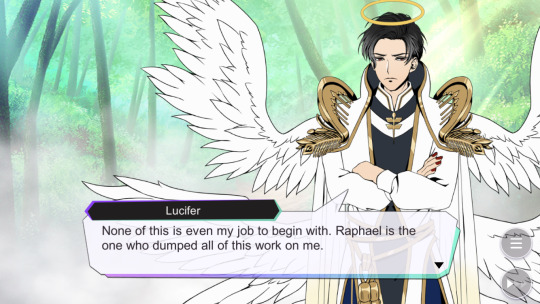
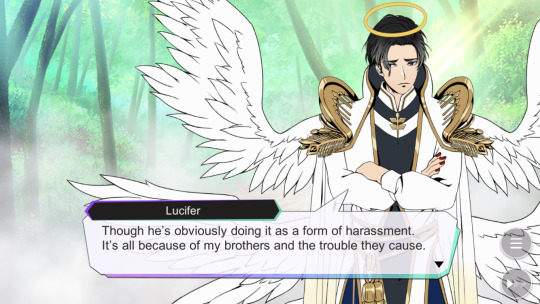
Lucifer proceeds to complain about Raphael dumping all his work onto him and Satan implies that Lucifer is letting the other angel bully him... and he’s not actually wrong. I’m not sure why Lucifer just couldn’t say “no” -- it’s not like he isn’t willing to in other contexts.
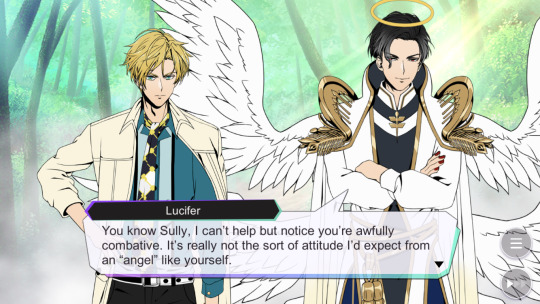
But Satan also can’t help himself, and it’s very clear early on that Lucifer knows he isn’t an angel. We are escorted to the library to sort books.
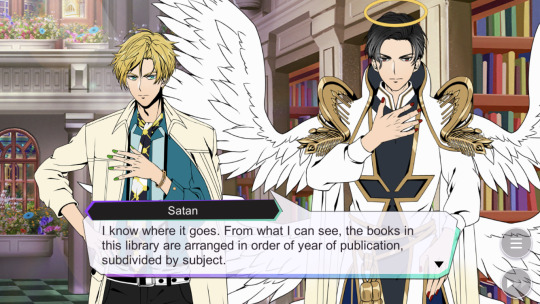

NEEEEEEEERD. Satan is a natural librarian, of course.
Lucifer continues to opine about his situation and Satan continues to needle him about it. There’s a cute moment when Lucifer admits there are few angels he can turn to for help or advice, and by contrast he feels Satan might be worth confiding in because he’s a fellow level-headed intellectual.
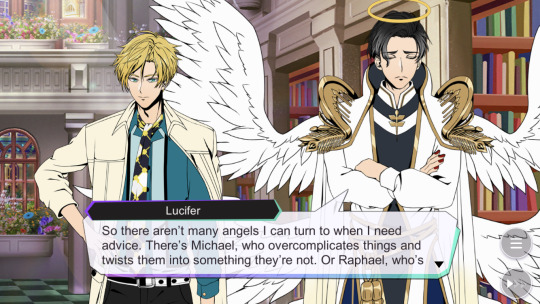
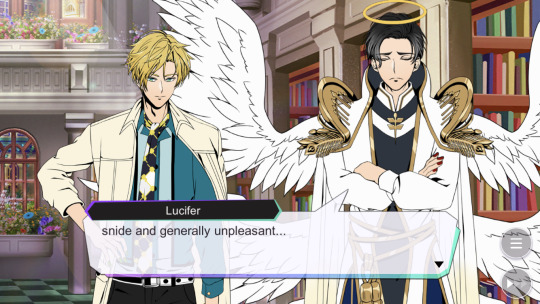
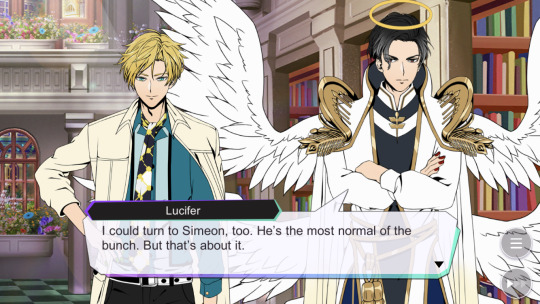

D’aaaaw. My only complaint is that he doesn’t really do this in the story; it’s only now being brought up for a bonding opportunity. The most we get is acknowledgement that Lucifer has a high opinion of Satan’s wealth of knowledge and expertise... he hasn’t really taken advantage of it.
It could be because the Avatar of Pride doesn’t feel he needs advice from anyone else.
The book comes up again, but...


It’s used as a trap to capture ‘Sully’ and reveal he is what Lucifer suspected he was: a demon.

Yeah I did but the game insists I be an unobservant moron for the plot to continue.


In my lesson 51 analysis I theorized the numbers in the title of the mysterious book related to a particular Bible verse meant to encourage believers to keep their faith, and while I can’t be 100% sure that’s what it was meant to allude to, this exchange seems to suggest it could have been. This arc is meant to instill Satan with more faith in Lucifer, because he’s constantly doubting his intent throughout this lesson.
But we discover that Lucifer has changed from who he was before we startled meddling in time travel dreams, by his own admission. You can probably make a good guess to who is responsible for that change (it’s actually not MC, though, believe it or not!).
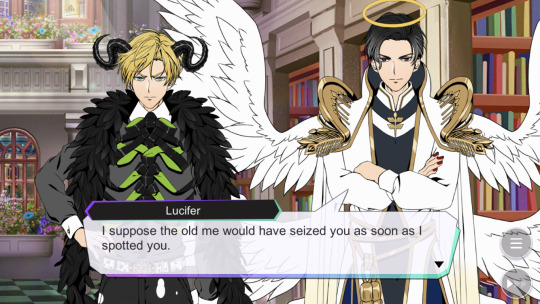

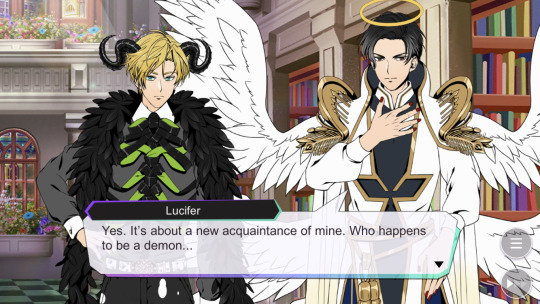
Yep, it’s Diavolo.

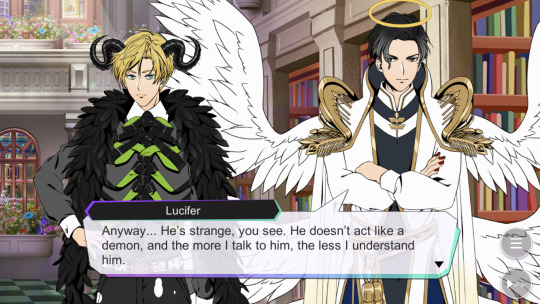
Diavolo doesn’t act the way Lucifer expected a demon to behave and it’s confusing him.
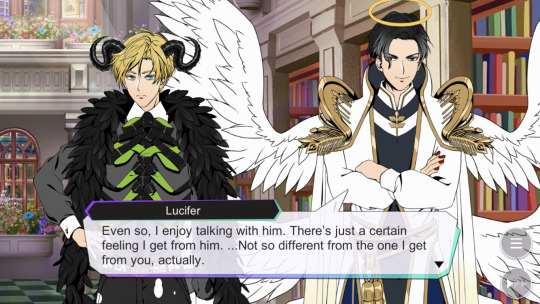
But he likes him, and he has had some time to digest that. Glory Days Lucifer would never have admitted this to anyone, let alone strangers.
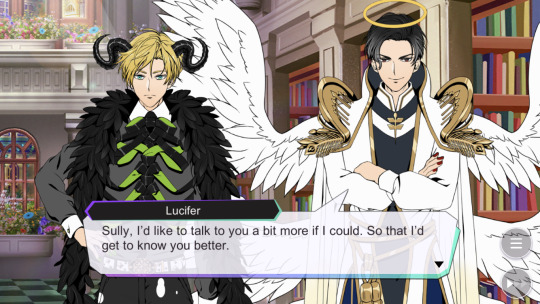
D’aaaaw.
Lucifer then turns his attention towards MC and asks about what they are. If you’re truthful, you get this interesting tidbit of information:
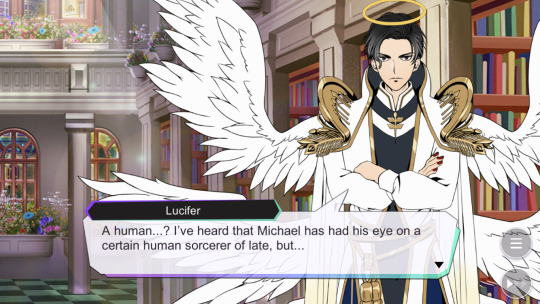
Michael has been scoping out Solomon before the Great Celestial War. Whatever for, I wonder? I don’t think angels offer pacts, and I suspect Solomon was a bit of a troublemaker even before he was given Michael’s ring.
My guess? Michael is Solomon’s guardian angel. It is probably the closest equivalent to forging a pact that angels have.
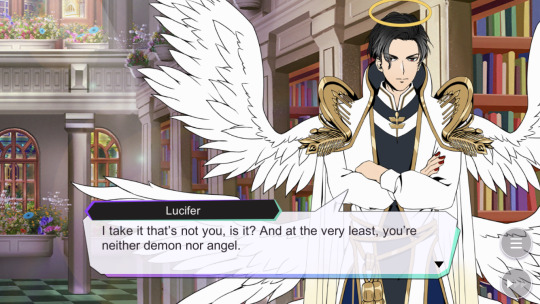
Yeah... I just told you I was a human lol.

A HUMAN.
(Nah I know it’s pretty obvious that we’re SPECIAL, at this point.)
Lucifer takes us to Simeon and the brothers, who are gathered in presumably Michael’s observatory-to-be. Lucifer decides to hi-jack Michael’s fun and steals the first chance to see the human world’s night sky for himself and his family. It is projected onto the walls of the room.


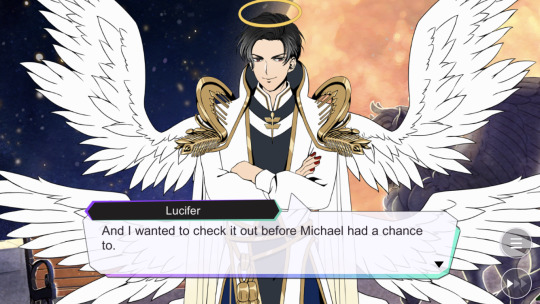
You can suggest Michael might be mad, and Lucifer makes it clear he gives no fucks.

The other option makes him explain he believes he’s owed this because Michael keeps making him go to the Devildom and never volunteers himself lol
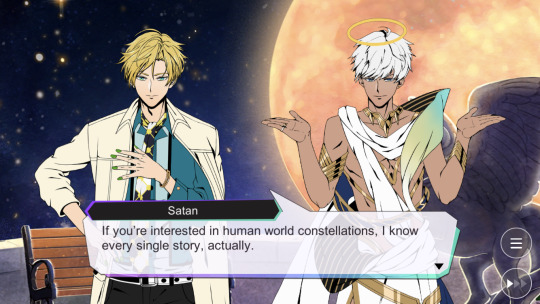
The brothers marvel at the spectacle, and they wonder about the stories behind each constellation. Mammon suggests Michael likely knows all about them, and Satan proceeds to nerd out again AND POTENTIALLY STEALS THAT MEMORY by making himself the one who teaches his brothers about the stars.
But, it’s Satan’s at his best, and he enjoys it thoroughly.
You and the brothers eventually doze off, and Satan wakes you up to share some private reflections.

Cute.
You realize Lucifer and Simeon are nowhere to be found, and run off to go see what they’re up to. They’re having a private moment of their own.
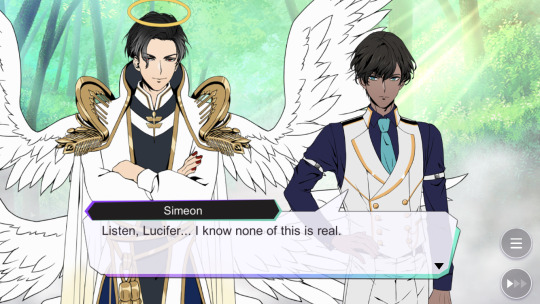
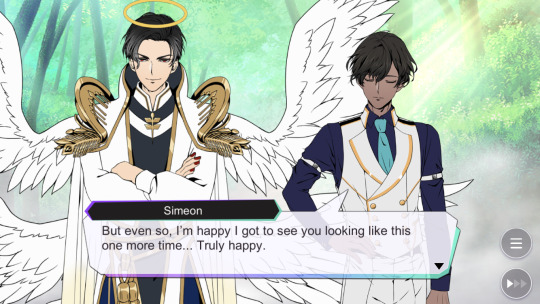
Simeon’s happy but sad. :(
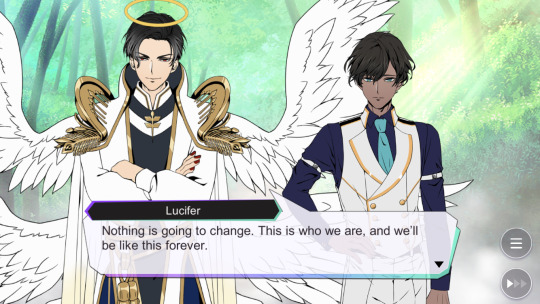
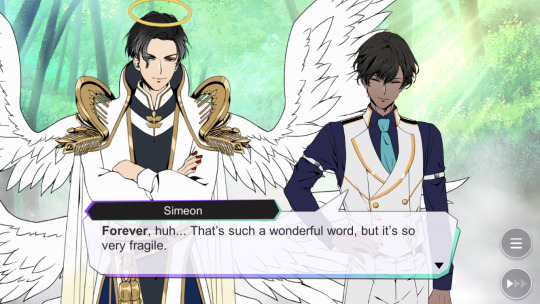
Yeah. I’ll have more to say about this particular moment in my analysis post. There’s a noteworthy parallel at play here.



Ruh roh. I think Simeon and Michael may have suspected Diavolo played a part in pushing Lucifer away from the Celestial Realm. If given the opportunity, I sense Simeon may have tried to talk him out of this doubt.
But he isn’t given the opportunity! We pass out and the screen goes black, accompanied by some creepy heartbeats. When we come to, we’re back in reality and in the care of Luke and Mammon.

Wow you guys had an exciting time being shoved offscreen didn’t you?
They puzzle over what transpired and Luke and Mammon confess they don’t remember anything of what happened after they stepped into the fake House of Lamentation.
Furthermore...

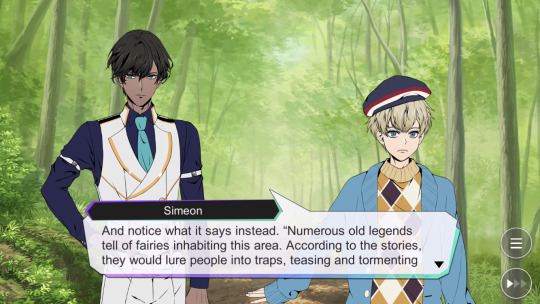
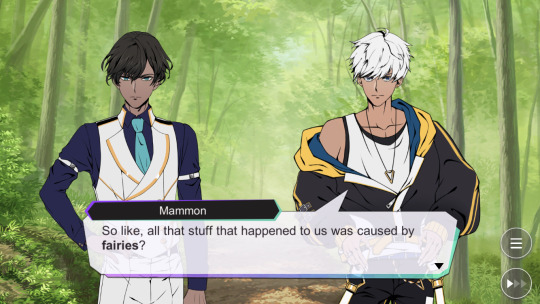
I was correct in my theory that it was an illusion, but it seems it was the work of regular ol’ fairies and not some creepy banshee. That was a red herring, apparently. It’s even more anti-climatic than expected.
Additionally, Satan unknowingly covered himself in fairy crack before he dropped in.


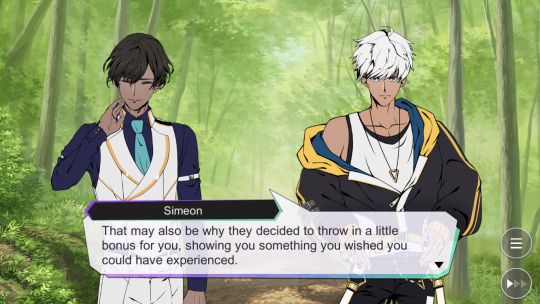
My question is: how the fuck does Simeon know all this? Did he hang out with fairies once upon a time?
They decide to give up the hunt for the fairy ring and return home.
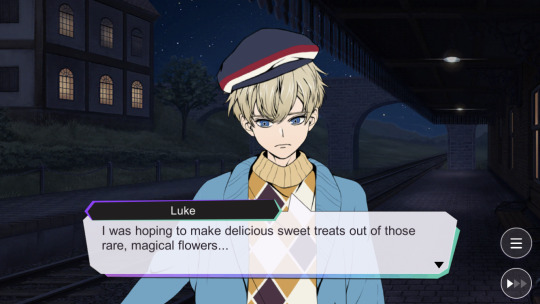

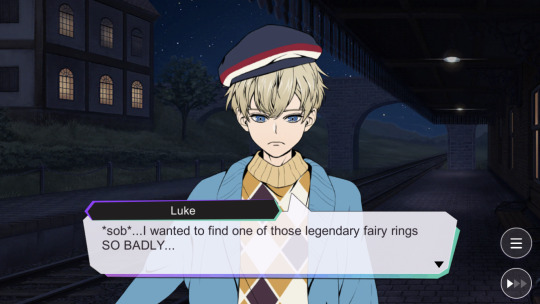
NOOOO THEY MADE LUKE CRY
If it were up to me I would have gone back and punched some fairies into submission until they forked over the ring, Luke. I’m sorry!
Of course, there’s not enough sleeper cars now that Simeon and Satan unexpectedly joined the party. Guess what they proceed to fight over!
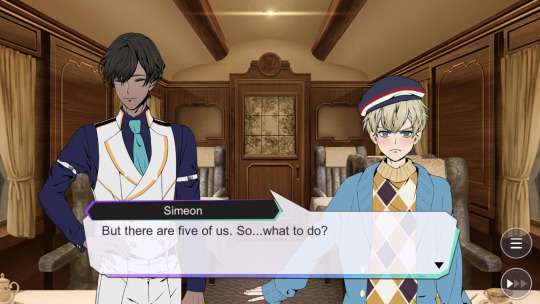
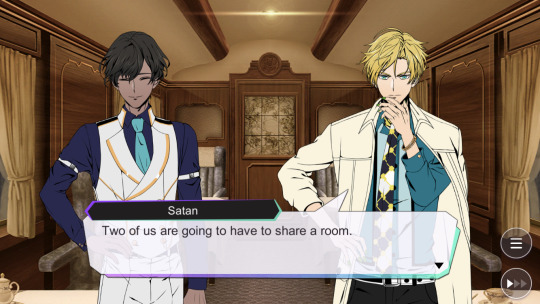
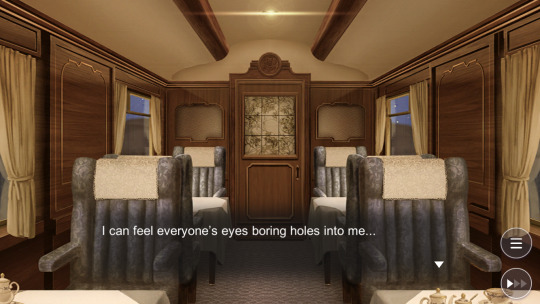
You flex your pacts to make Mammon and Satan stop squabbling.

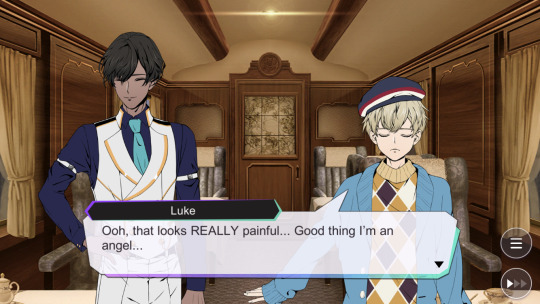
Are we sure Lucifer and Michael are the only angel sadists?

Simeon takes an unusual amount of delight in the suffering or discomfort of others lol
I think he’s just much better at hiding it.
Either way, it’s obvious he’s bothered by something, and after some deflection and prying he finally fesses up.
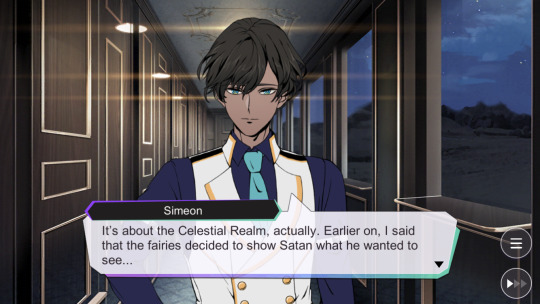
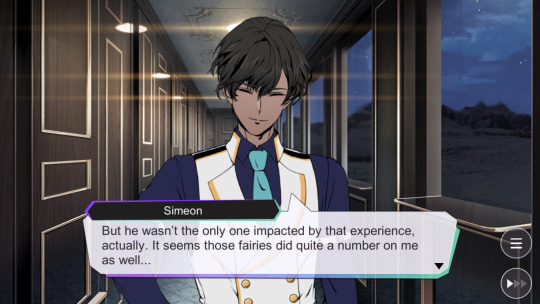
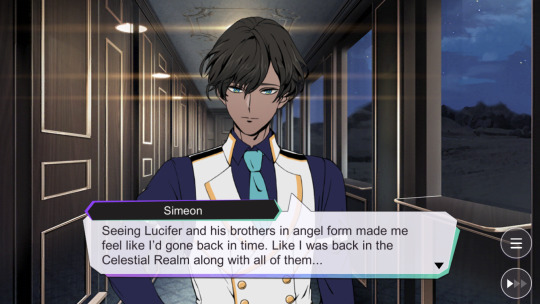
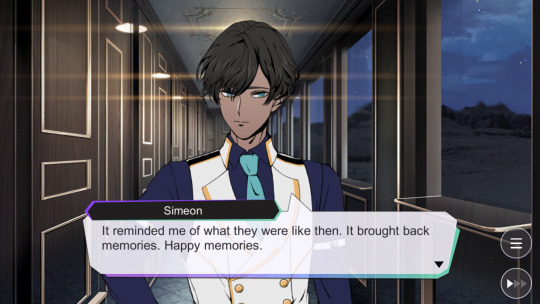

Michael and Simeon want them back BAD.

We finally get our first opportunity to get all sappy with Simeon here.
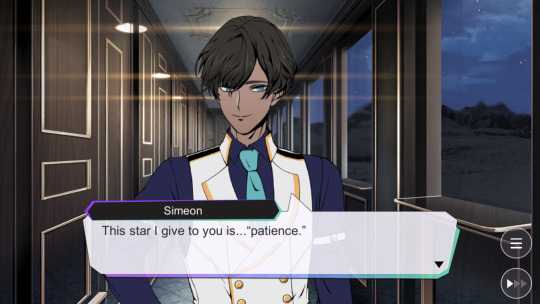
Well I was right about which trial this was supposed to be, at least!
Luke and Mammon are on the roof squabbling about constellations again.
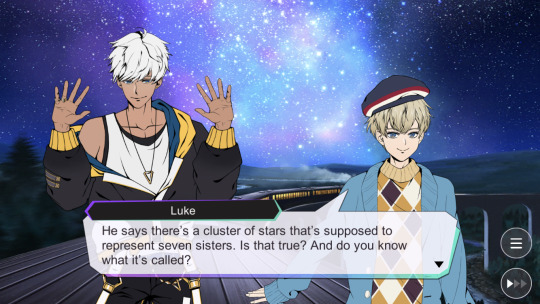
You’re treated to a mini-quiz about them. Have Google at the ready.
You find out there’s a constellation involving the seven brothers in the Celestial Realm, that was created (or at least named) after they fell.

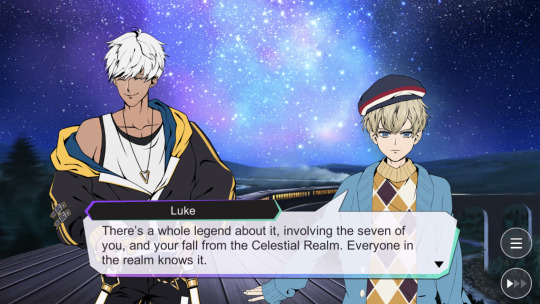
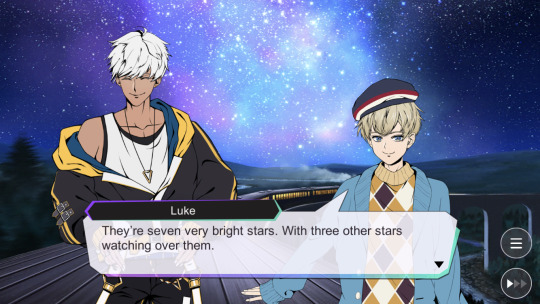
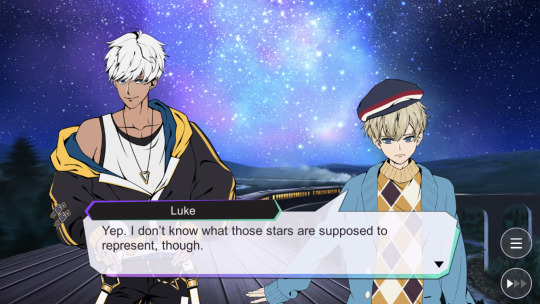
They begin to theorize what the other three stars may represent. Mammon thinks it’s Michael and the stars represent his face.
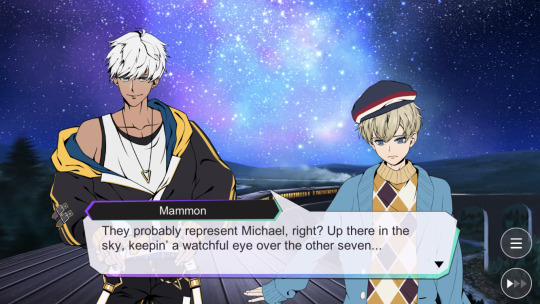
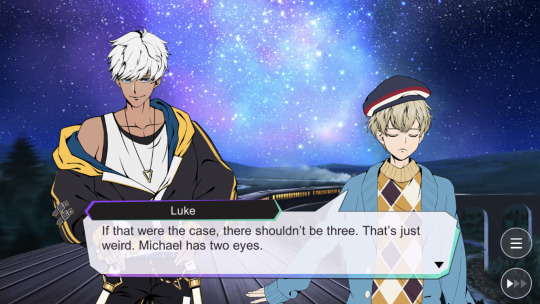
Satan chimes in with a much better take.
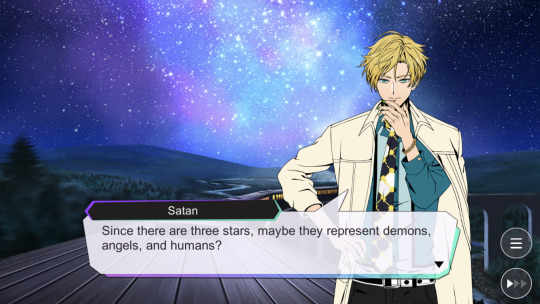

I think Satan’s mostly right, but the stars represent Diavolo/Michael/MC specifically: the three “guardians” of their respective realms, all of whom have deep connections with the brothers.
Solomon can also count as a guardian, but I don’t feel he has the same connection with the brothers that those three have.
And it turns out this was two trials!
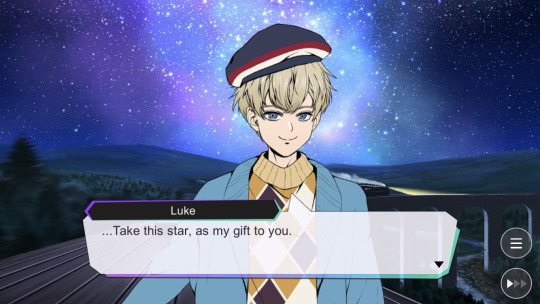
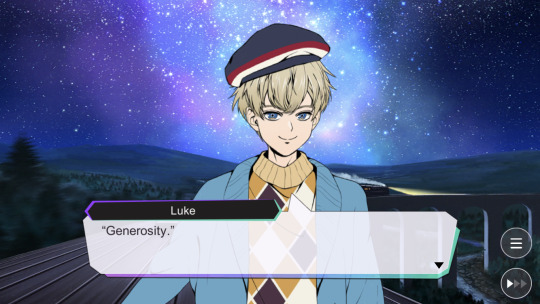
I completely forgot that generosity and gratitude were two of the virtues Solomon listed, so it’s not a complete copy of the seven virtues. But hey, it’s now four down and three to go!
We have eight more lessons to complete the remaining three, so we have plenty of time. But... what about the overarching plot? I was certain that something in this arc would finally jumpstart it, but that doesn’t seem to be the case.
But... maybe there was something hiding in there? I’ll go over the more important bits in my analysis post.
There’s still plenty of lore they haven’t covered re: the Celestial Realm and most of it has just been fluff. Satan’s creation remains a mystery: so far we’ve learned the Seraphim are assholes and Lucifer is overworked, but the latter is nothing new and I highly doubt that inspires enough visceral rage to make Lucifer absolutely hate his dad. We don’t know how the war unfolded and we don’t know why Simeon was demoted from his post. How things went is a big determining factor in trying to deduce Michael’s part in everything, and what he’s currently planning.
I’m hoping they get around to all the juicy bits, but I don’t know...
#obey me#obey me!#obey me lucifer#obey me simeon#obey me satan#obey me luke#obey me diavolo#obey me spoilers#obey me lesson 52#commentary
56 notes
·
View notes
Text
do you really need to bring shipper wars in the Austen fandom too?
Full offense but people who deny Emma is in love with Mr Knightley and hate on him because they ship her with Harriet, and pretend she should’ve ended up with her, are bullshit. I’m tired of these posts (including the Harriet stans whom I saw bashing even in some emma/knightley posts when fans of the latter are the first to make cute posts about Harriet too), and honestly, you all just make me feel very negative about Harriet and unable to truly appreciate her scenes with Emma.
Maybe I just don’t care about being a bitch but here’s what an Emma fan who is just tired of the anti Emma/Knightley crap honestly thinks about your nonsense:
Hating on the last Emma adaptation because Emma is in love with Mr Knightley and marries him in the end is as disingenuos and idiotic as hating a Pride and Prejudice adaptation because Darcy and Elizabeth are in love. Le duh!
You can ship him with Bingley and her with Charlotte (or Wickham, if that’s your mood I’m not judging shipping choices here) but if you watch a movie based on an Austen’s book you know what you are getting yourself into, especially when her canon romances tend to be very important plot elements for the protagonists and their character growth.
I get it’s 2021 and hating all het romance makes some people feel woke and edgy, and I totally get alternative readings and things like that, but out of ALL Austen ships and all her female heroines, Emma is the one female character who doesn’t even need, neither want, to get married and truly only does that in the end because she is in love. Emma is the LEAST Austen heroine whose romance you should even question because she honestly only married the guy because of love and no other reason. Furthermore, unlike most of romances from that time, the guy Emma marries isn’t just some random guy she has met two seconds ago, it actually is her best friend, someone she knows since years and the one person who knows her best and loves her in spite of her flaws. Austen was very forward for her time with their romance, especially given the fact her male love interest actually decides to live with Emma and her father in the end instead of doing what every married man had the right to do at the time (take his wife to his own home where she’d have little to no power).
Knightley and Emma are the (original) best friends to lovers relationship. He’s the best friend Emma had loved from the beginning without realizing it. It’s one of the main points of her story and the great irony of the novel that she thinks love isn’t for her, and she had never been in love, but she already is in love with him without realizing it because of their friendship.
I’m sorry bro but that had never been Harriet, and it seems hypocritical tbh for some of you to want to give Harriet the story that Mr Knightley has with Emma, all the while hating on him and the romance.
Even with the last movie, you have people take quotes de Wilde said about Knightley and Emma (e.g., the one about the movie making you think about ‘the best friend you maybe should have kissed’) out of context to manipulate others into thinking she was talking about Harriet instead (and queer baiting, which would be homophobic)
On one hand, we really do need more stories that put an emphasis on female friendships too and on other relationships that aren’t just the romance. On the other hand, it’s completely useless for writers to try to give us that (e.g. de Wilde in the last Emma) if everytime two characters care about each other and share screentime together, people claim that relationship (and all scenes that make perfect sense with a normal platonic relationship) must be romance and romance only.
It’s almost as if some of you never had a friend and therefore believe that everytime a character cares about another character they must be romantically in love with them. It also makes me believe, more than anything, that romance is the only kind of love that exists or is important for many of you. And if that is the truth, why even bother with fictional friendships then? Why even complain when writers don’t give us that if we are unable to appreciate those relationships as something of equal importance with romance?
I really can’t take people serioustly when they overinflate Harriet and her relationship with Emma all the while they minimize Emma/Knightley’s mutual feelings. I read people who apparently find it harder to erase Harriet’s baseless crushes on every guy who gives her attention, than erase the actual love story and feelings of the protagonist!
Tbh, even if you wanted a gay adaptation of Emma (and not one that is that just for the sake of), it would make much more sense to simply turn Mr Knightley into a female character, therefore still respecting the canon couple and Emma’s character arc, than ship her with Harriet.
The latter is a weak alternative and frankly baseless for me because the only things she and Emma have in common is the fact they are both girls and they have an ‘e’ in their name. Full stop. Intellectually, Harriet is no match for Emma and their ranks in society are so apart that their relationship could never ever be equal (and it never was).
I don’t want to be harsh but tbh I was never convinced they are actually friends in the novel, and the last movie made it even worse for they emphasized Harriet’s blindness about Emma’s feelings, and how one sided that dynamic is for it’s just Emma who makes an effort to be a friend in the end.
Let’s be real here, Harriet doesn’t even know Emma and never really acts as a friend to her, unless your definition of friendship is ‘someone who worships you, and pretends you are the best and right even when you aren’t, as long as they perceive you as a savior who can help them'. That’s not what being a friend means to me.
It speaks volumes to me that the one and only time movie-Harriet actually notices that Emma is a human being with flaws and feelings too is when she gets angry because Emma wants the same guy she wants. I don’t know if Austen’s ‘naive and completely clueless Harriet’ is worse or better than de Wilde’s version but the latter really emphasizes one of the biggest issues of Emma/Harriet even more, to me.
As a book Emma fan, before an adaptations fan, I read all kinds of comments about this novel and character but honestly, I never read any real convincing argument why Harriet and Emma should be a couple instead of her and Knightley. Most of what I read boils down to people taking things out of context and/or claims that Harriet is ‘better’ for Emma just because she’s a woman and she agrees with her all the time, while Mr Knightley is the bad guy because he’s older than her (he’s only 37, btw) and criticizes her ( as if Emma doesn’t need someone to criticize her, and her character growth isn’t dependent on precisely that).
I get some people wouldn’t like to have someone who is criticizing them but worshiping someone is =/= being their friend or appreciating their real qualities.
I also read people point up how much Emma praises Harriet in the book as proof that she’s in love with her, but the same ignore the many instances, especially after Harriet tells her that she loves Mr Knightley, that truly show Emma’s real colors and how much she still considers Harriet her, and especially Mr Knightley’s, inferior to the extent she regrets their friendship and thinks Harriet is ‘uppity’ for thinking Mr Knightley would ruin his reputation to marry someone like her.
When I read those arguments it seems, if anything, that people want to have the cake and eat it by saying that Austen’s own story doesn’t matter (and she doesn’t understand her characters’ real feelings) when it comes to the things those people don’t like (eg the fact Knightley is the one Emma is in love with and all the explicit hints about that ), all the while still selectively using some of her writing to support their alternative version of the story.
Now with the last movie adaptation, it’s even worse for me.
It’s telling that the two scenes people romanticize as pro Emma/Harriet are two phrases/moments that actually emphasize the bad side of their relationship, and why their friendship isn’t good for either of them.
The first is the scene when Emma says she ‘wants to keep Harriet for herself’: not only there is nothing romantic about that ( that line is in the book too as well as Knightley’s ‘your infatuation is blinding you’. You are reading a book written in 1800 with modern goggles though, and that alone doesn’t really work) but that phrase should actually make you cringe for it emphasizes how selfish and manipulative Emma is by treating Harriet like her new pet project just because she’s lonely. She doesn’t care about the girl’s feelings for Robert Martin, and what is truly the best for her due to her rank (and how dangerous it actually is for Harriet to not marry and find someone who can offer her protection), even if it’s what she tells herself, she only cares about her own desire to have a new female friend because she lost Mrs Weston and she feels lonely and bored. It’s also true, though, that she is still lying to Mr Knightley too because she does actually want to match Harriet with Mr Elton, that which is obvious in the other scenes, but even that is an expression of Emma’s selfishness and not really a hint of her caring, let alone loving, Harriet as a human at this point. If you read the book, it’s particularly obvious given the fact that Emma isn’t blind about Harriet’s feelings for Robert Martin for she knows that her behavior is bad and the girl actually cares about the guy, but she manipulates her into thinking Mr Elton is better because it’s her choice and she prefers him (until he proposes to her, of course. Then she thinks Mr Elton is trash for being so arrogant to believe someone of his rank could marry her)
The second phrase people romanticize is only in the last movie and it’s that annoying ‘I refused Robert Martin because of you’ phrase by Harriet later in the movie. I hate that because, once again, that phrase has nothing ‘romantic’ about it unless you obviously ignore the context and what is actually happening there. Harriet is being passive aggressive with Emma there, gaslighting her and blaming her for the loss of her first suitor BECAUSE HARRIET WANTS MR KNIGHTLEY for herself. Harriet is angry with Emma there because she realizes she loves Mr Knightley TOO and Emma has more chances than her. The most likely sentiment behind that flippant phrase for me is something along the lines of Harriet impulsively telling Emma to move aside and let her have Mr Knightley because she made her lose Robert Martin already. She is trying to make Emma feel guilty, subconsciously or deliberately, but this surely is how Emma herself perceives Harriet’s words too for the poor girl really thinks it makes her a bad person to accept Knightley’s proposal in spite of loving him back. Harriet made her believe she was stealing her man and yet, AND YET, had Harriet been a real friend, to begin with, she should’ve realized Emma’s feelings for him way before she deluded herself into thinking the guy wanted her. But Harriet never cares about Emma’s feelings and even their reconciliation in the end is all, still, about what Emma needs to do for her. Not a word from Harriet about being happy for her friend too. Nothing.
Listen, I really appreciate de Wilde’s attempt to make the Harriet/Emma dynamic better than it is in either the novel or other adaptations, even if it personally doesn’t convince me it’s friendship. But I get it. Like I said at the beginning, it’s important that movies display different kinds of love too beside romance and if you can’t do that with characters like Emma who are the protagonist then when you can even do that? I think it was valid for her and Catton to want to emphasize the fact that Emma, at her core, is truly young and lonely and she doesn’t have friends in the truest sense of the word (Mr Knightley is one, of course, but their point is more about her having a female companion too whom Emma could do more ‘girl’ things she can’t do with her husband or father) but, honestly, I maintain no adaptation ever truly got their relationship right. No one.
Overrating them and pretending that they are best friends forever when there is no substance for that is as incorrect as an interpretation of Austen’s writing as it is treating Harriet as a silly girl Emma barely tolerates.
I appreciate the movie shows Emma’s conflict about Harriet when Knightley proposes to her because most of adaptations don’t do that: in the book she really, for a moment, feels so bad for Harriet and feels simultanously happy Mr Knightley loves her but also bad for taking the guy Harriet wants. She is no hero who wants to give up about him to let Harriet have the guy instead, though, but it isn’t like she doesn’t care either. She does and it’s a source of anguish for Emma and part of her character growth that she actually cares and feels empathy for Harriet.
However, if you want Emma to have a real female friend that’s not Harriet and that’s not really the story Austen wrote and the role she gave to Harriet.
Like many academics pointed up, like many of Emma’s ‘mirrors’ in the story, Harriet is put there by Austen to emphasize Emma’s immaturity at the beginning and the fact she deliberately doesn’t choose her equals as friends and picks Harriet, instead, as her new pet project because her inferiority makes her easier to manipulate and, like Mr Knightley very eloquently points up, she makes Emma feel superior and more accomplished than she is. Emma doesn’t want to be friends with Jane, for example, because not only she could be more her equal but she actually does see her as superior in the aspects that make Emma the most vulnerable and insecure.
It’s great the movie gave more space to Emma’s relationship with Harriet, and I get that if you want to put the spotlight on female friendship too it’s either Harriet or Mrs Weston but also, let’s not pretend the movie wasn’t focused very much on her romance with Mr Knightley too, perhaps more than other adaptations did. People commend this adaptation for showing his feelings for her more and it’s true, but I will also argue that this movie does emphasize her feelings for him more than adaptations usually do for you really see Emma’s feelings and jealousy towards him before she even realizes her feelings. It’s obvious since their first scene when she’s waiting for him and runs to her piano because she wants to get noticed by him. Her breath constantly hitches when he’s close to her or because of her feelings for him, and she definitely reacts to dancing with him. She may not know her feelings from the start, she might be in her own ‘work in progress’ to figure everything out, but the movie makes it obvious to me that she loves him. If there is any adaptation where you want to be disingenuos about their chemistry and deny their romance, this really isn’t the one tbh.
Look, if you want to headcanon Emma as bisexual you’ll find me agreeing with you, but pro LGBT readings and actual representation doesn’t mean, for me, shipping two characters together just because they are the same gender and the writers make them care about each other a bit, or give them screentime. Like I said at the beginning, if I wanted a gay adaptation of Emma I’d rather make Mr Knightley a woman than ship Emma with Harriet or Mrs Weston or Jane. Because regardless their genders, it’s the Knightley character the one Emma loves and wants to be with, and it’s this character who truly represents her best friend and the person who knows her best. It’s Knightley the only one who cares about her well being so much that when she is being the worst version of herself and no one cares, he is the one willing to tell her even if he hates doing that and he feels he’s destroying every chance he has to make her love him back. It’s the Knightley character who ultimately inspires her to be a better person and loves her in spite of her flaws.
#emma 2020#emma woodhouse#emma#harriet smith#mr knightley#emma x knightley#may delete later but I needed to rant because some of you are getting old
97 notes
·
View notes
Text
“Orientalia”: White Fascination and Nostalgia for China and the Orient
4/11/2021
Denver, CO
CW: Racism, anti-Asian and anti-Chinese sentiment, violence/sexual assault
Preface:
Today was certainly a day. I’ve been on a cross country trek, which I’ve come to call “The Great Journey East”, where I’m driving from my home in the Seattle area to Portland, Maine to ply my usual trade, working aboard some traditionally rigged sailing vessels that operate from the Maine State Pier. I’ve most recently arrived in Denver, CO, after a tumultuous night of camping in un-ideal circumstances on the shores of Great Salt Lake in Utah. I decided to treat myself to a middling hotel downtown to try to affect an aura of urban tranquility before I head out for Wichita in the morning, and then on to see my mother’s family in Oklahoma. The drive thus far has been marked by astounding natural beauty, kind people, and a long series of audio books that I’ve only just begun to make a dent in. I began this journey listening to “Tribe” by Sebastian Junger, which I found to be extremely interesting and helped some of my own understanding of how society today does not serve the community, and how we may one day return to a society where the people come first, as opposed to the individual. After finishing Mr Junger’s audiobook, I turned my ears to a tome that I have put off reading for a long time: “The Chinese in America: A Narrative History” by Iris Chang.
Listening to this audiobook over the last few days, which begins in Qing dynasty China and ends in the modern day, I can say a great many things. I can say that I deeply feel the experiences that were collected by the author and compiled into this book, not only on an intellectual and emotional level, but on a spiritual level. I can say that, despite years of my own research into my familial experiences and the experiences of contemporary Chinese Americans, my level of knowledge was severely lacking, even though I considered myself to be a relatively robust lay-scholar on the topic. I can say that the experience of we Chinese Americans, foreign and natural born, has changed very little in our time here. While circumstances change from person to person, family to family, and era to era, we are all bound together in trends that have haunted our communities, not unlike the tigers that have stalked southeast Asia for time immemorial, striking out when least expected.
All of that, however, is a surface level understanding. Those realities are the first few layers of a complicated and long history of horrific, violent, brutal, and inhuman oppression in the United States.
I began this audiobook believing that I knew most of what I needed, enough to enlighten the odd person in online discourse, or conversation over dinner. Enough to tell-off the casual bigot that accused me and other Chinese people of overblowing our racial, social, and economic anxieties while making them look a fool. I realized very quickly that while I was not wrong in my knowledge, my staunchly anti-racist rhetoric, or my suspicious attitudes towards the US government and law enforcement, I was missing so much of the story. I was not missing the statistics or the legislative history: I was missing word-to-paper stories of my ancestors -- our ancestors -- and the cold, hard, and hellacious reality that they faced when they got here. These realities may have differed from generation to generation (the Chinese washer-man and washer-woman, miner, and restaurateur of the 19th century was faced with markedly different circumstances from the Chinese who fled WWII, the PRC, or settled in other areas of the world during the diaspora), but they are cold and hard, none-the-less.
I have cried more in the last three days than I think I have in the last three years. My heart hurts for our ancestors, our elders, our parents, our siblings, our uncles, our aunties, and our future children as we exist in a country that has committed nearly every atrocity it could think of to rid us from their stolen land.
This was the state of being I’ve come to Denver with. Finally in the privacy of a hotel room, I showered and talked with my partner. She found a book today, written by the child of white missionaries who fled China just before WWII, that was a compilation of “Oriental” inspired needle-work patterns. She shared the preface of this book with me, which I found to be incredibly alarming, and has prompted me to write on the subject of “Orientalism”, the exotic, and how the experience of white Europeans and Americans in China was vastly different from the Chinese people. Out of respect for the author and their work, which I believe was written as an honest tribute to Chinese culture and its influence on them, I am choosing to omit the author’s name and the title of the book in question. While some may see this as underhanded, I am choosing to do so because I do not wish to wage a war of rhetoric with an author who I have very little personal knowledge of, because I believe it is unethical of me to do so.
However, I will be addressing some problematic concepts that are present in the preface of this book, as they are worth speaking about as we attempt to further society’s collective understanding of differential experiences between people and people groups.
Thank you for reading on, as well as for reading my preface. The following issues are things that I have struggled with for a long time, and I hope that my words bring you additional perspective on Chinese American issues.
“The Orient, the Oriental, and Orientalia: A Curious Lens of Exoticism Riddled with Racism”
Today, I saw a word that I had not seen in a very, very long time.
As most any Asian person will tell you, the words “orient” and “oriental” are generally unwelcome descriptors of Asian people and culture. These two descriptors are applied to clothing, architecture, pottery, art, furniture, cookware -- the list keeps going. I often joke to those who use these words, “what am I, a rug to you?”, which normally drives the point home in a friendly way They are both hangers-on from an era that we’d best leave in the past. An era where the Occident and the Orient were opposites of one another, incompatible, and fundamentally in conflict. The two terms saw relatively common usage in the 19th century, and many Euro-Americans considered “the orient” to be interchangeable with “the far east” while the occident was a catch-all word for Euro-American civilizations ranging from western Europe to the New World. It could be said that the Occident and the Orient began as harmless descriptor words that only communicated a vague notion of differences between cultures, they were rapidly weaponized as anti-Asian, especially anti-Chinese, sentiments began to flare in the western world. Imperial Germany used the two terms to great affect, framing the differences between the Occident and the Orient to be far more than cultural and societal. It was a matter of life and death.
The Occident was the pinnacle of industrialized civilization. It was moral and upright, beholden to the Christian god, supported by the titans of industry, government, and cutting-edge military technology. The Orient was backwards, overrun with dirty Chinese heathens who constantly lied, cheated, and stole from the superior whites. The Chinese were looking to enslave white women, turning them into sex slaves or take them as wives so that they could propagate a wretched half-breed race that would overrun the world and mark the end of all Occidental civilization.
This rhetoric was incredibly powerful, and one only needs to look at early anti-Chinese political cartoons and articles to see these words used in incredibly derogatory ways. The other side of the Orient/Oriental dichotomy was steeped in foreign luxury and exoticism, which served to peak the interest of wealthy whites that bought up all kinds of Asian furniture, clothing, fabrics, cookware, and art from unscrupulous dealers and certifiable importers alike. Affluent white women of the 19th century are well-documented as being deeply invested in luxurious goods imported from “the Orient” and marketed as “Oriental” or “Orientalia” to garner societal notoriety, whereas their fathers, husbands, brothers, and sons would have dressing gowns, cravats, and handkerchiefs created out of fine imported silk. All of these goods were considered exotic and other-worldly, which is not a debased outlook for the time, considering that so few westerners had actually managed to travel in the vicinity of China, let alone disembark in one of the few official trading ports open to European traders. This fascination with all things Chinese, entirely divorced from the reality that many Europeans and Americans viewed the Chinese as grave existential threats to white civilization, is not without irony.
While Chinese peasants and workers died in droves from starvation, disease, localized conflict, or at the hands of white Europeans and Americans acting with impunity in a country that was barred from holding them legally accountable for their actions, cargo hold upon cargo hold of Chinese goods were exported for consumption by westerners. These westerners had military and diplomatic presence in China, especially in the mid to late 19th century, often seizing prime real estate in Chinese port cities for international settlements where it was the westerners, not the Chinese, in charge. These ostentatious settlements, coupled with missions run by Christian organizations from all over the western world, exercised great influence with local Qing dynasty officials, and western nationals all throughout the southern coast of China were free to use and abuse the Chinese around them as they please. These prosperous settlements, a highly visible and permanent show of colonization and foreign aggression, were made so by the labor of Chinese workers and peasants. The same workers who were forced into horrific working conditions in and around the settlements while western nationals were free to treat them as they please with no repercussions, ever for outright murder. Any fascination with the Chinese lifestyle, manner of dress, and other items that could be quickly imported to the west as exotic tokens of the Orient was inherently divorced from the horrific reality of daily life within China, and was nearly always a fascination that arose from social tiers that could afford to be ignorant of those realities while directly benefiting from them.
“Orientalia and the Noble Savage”
The westerners’ fascination with all things Orientalia outlines another phenomenon present in the west’s view of China in the 19th and 20th centuries, an phenomenon that Americans are familiar with as it is applied to Indigenous peoples in North America: the Noble Savage.
The Noble Savage idea and stereotype found quick traction with American colonists as they fought to drive out Indigenous peoples from their ancestral lands all over North America. These Indigenous groups, savage as they were perceived to be, were often regarded as principled and noble in their way of life, whether that was seen in their treatment of the lands, natural resources, their art and craftwork, their societal structure, or in how they treated white settlers when they were taken prisoner. While all of this talk of nobility betrayed the slimmest undercurrents of admiration from white settlers towards Indigenous peoples, the second word of the phrase was integral to its application: Savage. Despite these noble ideas and practices, a savage is a savage is a savage. This two-faced admiration served only one purpose -- to communicate the slightest inkling of fake remorse in widespread acts of genocide against people that white settlers hated and chose not to understand.
For the Chinese and Chinese Americans, the idea of the noble savage is easily translated. While Indigenous peoples in North America had a comparatively low level of technology to Americans, the same could not be said of the Chinese. Despite lacking robust gunpowder arms and other advanced forms of military technology, the technological prowess of the Chinese people was without doubt. Massive cities, sprawling agriculture, advanced irrigation, roads, palaces, and so much more was plainly evident to any westerner who arrived on Chinese shores (the same can be said of Indigenous populations throughout the Americas despite the prevailing myth of "primordial wilderness" perpetuated by white settlers) . Despite the different perspectives that westerns had between the two groups, westerners applied the Noble Savage ideal to the Chinese just as quickly and easily as they did to the Indigenous peoples across the oceans.
While the Chinese were obviously proficient in architecture, engineering, and in art, many westerners were quick to follow up any admiration of their eastern counterparts with staunch, racial criticism, highlighting their savagery in their daily lives such as gambling, long fingernails, or their seemingly archaic dress. Much of the criticism leveled on the basis of savagery had to deal with the assumption that Chinese men would, without hesitation, steal from white men and kill them, while selling white women into slavery. And while this was based in very loose reality (the triad societies of Canton did, indeed, participate in the sex trafficking of Chinese women to California and the Coolie trade that sent enslaved Chinese men to work on plantations in South America), the fears were stoked by ferocious anti-Chinese rhetoric in Europe and America.
The Chinese who emigrated to America were seen no different, and while public opinion waxed and waned, it was always understood that the Chinaman was a noble savage at best, and the earthly embodiment of evil at his worst. While modern Chinese and Chinese Americans may not be subject to the Noble Savage ideas from two centuries ago, it is not uncommon for Americans, especially white American youths, to take this idea as gospel, tormenting their Asian classmates throughout their formative years.
“China’s Sorrow: Nostalgia for a China that did not exist”
(As a forewarning, this the section where I may become quite emotional.)
Something that I encountered today was nostalgia. Not my own nostalgia, but the nostalgia of an author who grew up in a mission or international settlement in pre-WWII China, and fled from the country just before Pearl Harbor. This author, who shall remain nameless for the reason I stated in the preface of this essay, spoke highly of China’s sights and sounds, the people, the food, the craftwork, and of their pleasant life as the child of white missionaries in China. They spoke on how the pace of life in China was different than America, and that they much preferred the comforts of life in the Orient, surrounded by Oriental people and objects, enamored with Orientialia well into their adult life.
I found this passage to be absolutely appalling. I understand that I may be picking the wrong fight here, but this is my emotional response to an issue that I have found difficult to articulate that managed to, somehow, someway, manifest succinctly in the preface of a book that I randomly encountered. I lay my thoughts here:
White missionaries in China lived privileged lives, much like the other westerners that inhabited international settlements all throughout the major cities of the country. Missionaries, like the other westerners, were an extremely privileged class, living privileged lives in a country that was being torn apart by colonization, internal strife, famine, disease, and violence. While the average Chinese peasant in late Qing, early republic-era China had to contend with the daily realities of starvation, material scarcity, and the reality that a western could beat them or kill them and face no legal consequences for that action. Merchants were forced to deal with countless one-sided trade and land treaties, while government officials struggled to keep the country together, if they weren’t themselves contributing to the horrendous reality. Life in international settlements for western nationals is often reminisced upon as idyllic, quaint, and prosperous, which paints a stark contrast to their Chinese neighbors’ experiences. The westerners were off-limits, exempt from legal prosecution, and largely able to conduct themselves as they saw fit, even when their conduct directly endangered Chinese lives.
Meanwhile, outside of these international settlements, war ravaged the country. When the Qing dynasty fell and the Republic of China was established, the country fractured. The nationalist government was constantly at war, sometimes with itself, sometimes with bandits and warlords, sometimes with organized crime, and most of all with the Chinese Communist Party. The Koumintang government, in the wake of Sun Yat-sen’s death, saw Chiang Kai-shek seize power. The Japanese began to aggressively push their borders into China, fighting with superior military technology and training while the national army faltered from unwilling conscripts led into disastrous battles by inept, corrupt, and tyrannical officers. The CCP fought a guerilla campaign against the KMT that further muddied the conflict, with innocents caught between two radical and violent sides while Japan tightened the noose. Communist and Nationalist fought together against the Japanese one day, and may have fought against each other the next.
While the country was torn apart, the westerners in international settlements were unconcerned with the wars raging across the land. They continued to live their idyllic lives until the war was literally at their doorstop -- only then did they become concerned with the plight of the Chinese people.
Only then did the westerners in international settlements care for the circumstances of the average Chinese peasant in the countryside or worker in the city. They could bear no concern while they benefited from cheap Chinese labor, horrific working conditions, or while some of them got away with murder. They could bear no concern while Europe and America colonized China and ransacked the economy. And they could bear no concern for the Chinese being tortured, beaten, raped, and murdered in the countryside, far from their gates, until it was on their doorstep.
The nostalgia that some westerners feel for China, a China that existed before the chaos of the 1920s onwards, is propped up by lives of privilege and white-washed memories that ignore the struggle of the Chinese people right under their noses.
They feel nostalgia for a China that did not exist, because the one that existed was destroyed in part by their international settlements and the colonization efforts of their home countries.
This nostalgia for a China that was at least slightly better than the chaos of the 1920s through the 1940s, or better than the Cultural Revolution, or better before Tiananmen Square exists also within the Chinese immigrant community. But this nostalgia strikes in a way that the other does not.
While the westerner who lived in an international settlement may be able to intellectually sympathize with the Chinese experience during this tumultuous time, it is the Chinese themselves who bear the actual scars. Many of our elders long for a prosperous China as well, but there is a key difference in this: our elders, our family, sometimes we ourselves, bear the scars of the past. Our nostalgia is momentary, continuously shattered by the very real heartbreak that the Chinese and Chinese American community has been subject to over the last century. While circumstances and perspectives differed, the China that some of us long for is just as much a painful sore on our souls as it is a pleasant memory. The pain, the loss, the grief, anxiety, and struggle.
It is a nostalgia for our ancestral land that cannot be found anywhere else, as precious as it is painful.
Hsu Liang Yu
12 notes
·
View notes
Link
In September of 2020, I published a book entitled The Stakes. It was billed as a “current events” or election-year title. The election behind us, the candidate I recommended is no longer president. But the analysis which led me to that recommendation is very much still “current.”
To recap briefly (but read the whole thing!), the book explains how every prominent and powerful American institution, including the federal government, has been taken over by a hostile elite who use their vast powers to attack, despoil, and insult about half the nation. In the sixth chapter (excerpted here), I outline what I think America will look like if the present ruling class refuses to moderate, cannot be forced to share power, and has the wherewithal to keep its regime going. In the seventh chapter, I sketch several possibilities—from secession to Caesarism to collapse—that might result if it turns out that our overlords are a lot less competent than they think. And in the final chapter (excerpted here), I offer policy and other ideas that might enable America to avoid those fates.
That chapter (from which this essay is adapted) culminated with a proposal now being talked about widely, namely, to allow counties, cities, and towns unhappy with their current state government to join another. This would be a practical, and practicable, way to ease Blue and Red Americans’ present discontent and exasperation with each other.
There are precedents. The counties that became Maine split from Massachusetts in 1820, and—more famously—those that became West Virginia left Virginia during the Civil War. Fittingly, when I wrote the chapter, West Virginia had generously offered to welcome western Virginia counties unhappy with rule from newly, aggressively Blue Richmond. Today, a year later, West Virginia’s governor says the offer still stands.
There are similar movements throughout the country—most, though not all, driven by disaffected Reds. The most recent, news-making example was five Oregon counties joining two others in voting to leave the Beaver State and become part of Idaho.
So far nothing has come of any of this. But why shouldn’t these efforts be allowed to proceed if both the welcoming state and the exiting counties want it? Wouldn’t that be “democracy”?
…
Classical philosophers and historians alike condemn democracy as a bad form of government, in part because of its partiality but mostly because of the specific nature of the demos, which they contend is the polis’s least wise and least moderate part.
I would here add that it’s both sad and hilarious to see classically-trained academics and intellectuals bleat on about the sanctity of “democracy.” The worst offenders are the Straussians, who really should know better. Haven’t we all read Republic VIII and Politics VI, to say nothing of the warnings from Strauss himself on the dangers and shortcomings of democracy? Their failure as analysts is worse. The present American regime that they celebrate as “our democracy” is all but identical to classical oligarchy (discussed in those same books) while the “populism” that gives them the vapors is much closer to the democracy they claim to revere. But even more embarrassing, the Straussians’ central boast is to stand above, in Olympian detachment and even disdain, all regime pieties and see through them as self-serving rationalizations. Yet when extolling “democracy,” they sound no different than an Assistant Secretary of State, foundation president, or CNN host.
…
States such as California, Colorado, Illinois, New York, and now Virginia are utterly dominated by one party, and often one city, which amounts to the same thing. This is how Virginia—cradle of the American Revolution and home to four of our first five presidents—suddenly, just like that, became implacably hostile to the first two amendments to the United States Constitution. Five cities and counties, three adjacent to Washington, D.C., essentially dictate to the other 128.
The uncomprehending angst of people who’ve lived the same way, in the same places, for generations suddenly finding themselves harassed by a hostile government—ostensibly “theirs”—is mocked by the ruling class as a lament over “lost privilege.” After Virginia flipped from purple to Blue in 2019, the state legislature immediately enacted draconian gun restrictions that flew in the face of centuries of tradition and peaceful practice. Too bad! You lost! That’s “democracy.” As Joel Kotkin has remarked, “The worst thing in the world to be is the Red part of a Blue state.”
We should not, however, give the powers-that-be too much credit for principled consistency. If and when popular majorities produce outcomes the rulers don’t like, their devotion to “democracy” instantly evaporates. Judges, administrative state agencies, private companies—whichever is most able in the moment to overturn the will of unruly voters—will intervene to restore ruling class diktats. On the other hand, when voters can be counted on to vote the right way, then voting becomes the necessary and sufficient step for sanctifying any political outcome. It doesn’t even matter where the votes (or voters) come from, so long as they vote the right way. The fact that they vote the right way is sufficient to justify and even ennoble their participation in “our democracy.”
Blues perpetually outvoting Reds and ruling unopposed: this, and only this, is what “democracy” means today.
Bad Faith Objections
Reds, increasingly, are catching on. They know the game is rigged, that they cannot win, and the veneer of their participation and consent is a sham.
This is why the gaslighting is being dialed up to the lumen levels of blue stars. Every objection to Blue despoilation is now openly ascribed to “white supremacy.” Don’t want to be late for work because regime-favored thugs “protesters” are illegally blocking an intersection? White supremacy! Object to being beaten on the streets? White supremacy! Want to see the laws enforced equally and impartially? White supremacy!
Obviously, nothing is more susceptible to this dread charge than calls for “secession.” Hence the entirely apples-to-oranges cases of redrawing state lines better to reflect residents’ preferences and interests will be—already is being—compared to the events of 1860-61.
…
Some opponents of Red attempts to leave Blue states will disingenuously point to Lincoln’s first inaugural address, the ne plus ultra anti-secession argument. But there Lincoln was talking about replacing ballots with bullets throughout a sovereign state—overturning not merely the outcome of one election but the form of government itself. The peaceful rearrangement of political and administrative boundaries within a sovereign state is an entirely different act, with far lesser—and less grave—consequences. Indeed, in the latter case the consequences may be entirely salutary: there is ample precedent in history and around the world of countries redrawing internal lines to suit shifts in population and interests.
Others will try to muddy the waters by facilely equating the peculiarly American use of the word “state” for our 50 regional governments with the far more common meaning of state as “sovereign and independent country.” Lincoln said secession was unlawful, unconstitutional, and immoral—but this hypocrite Anton who claims to be a Lincolnite is endorsing the very practice! The argument is false and will be offered in bad faith. If you wish to waste a moment of your time, which I don’t recommend, remind such liars that the anti-secessionist Lincoln not only supported but presided over the division of Virginia. The decisive point is that this proposal is here proffered for precisely Lincolnite reasons: to save the Union and keep the current territory and population of the United States together.
…
Article IV, Section 3 states that “no new State shall be formed or erected within the Jurisdiction of any other State; nor any State be formed by the Junction of two or more States, or Parts of States, without the Consent of the Legislatures of the States concerned as well as of the Congress.”
In the Maine and West Virginia cases, new states were formed, hence the legislatures of the original and prospective states, plus the Congress, had to consent. (In the case of Virginia, then in rebellion against the government of the United States, two competing state governments existed. The Unionist government, recognized by the federal government, voted to allow the separation.)
The Constitution is, however, silent on the question of transferring a county from one state to another. No doubt should rural Virginia counties seek to join Charleston, Richmond wouldn’t like it—all that lost tax revenue! Look how many fewer people to boss around! Fewer Electoral votes!
But, constitutionally speaking, the state government’s power to stop it would be dubious. As would, if we want to speculate along such lines, the means. It could, and almost certainly would, take the issue to federal court where, admittedly, any outcome is possible regardless of law, and any outcome favorable to Red interests extremely unlikely. There’s little question that a Blue state capital could easily join with the federal judiciary and the Biden administration to block any such action. That may or may not be “constitutional” as you and I understand the term, but we don’t rule.
Or suppose we interpret Article IV, Section 3 to mean that moving just one county from one state to another constitutes creating a “new state.” That makes things harder, but hardly impossible. It simply means that legislative victories would have to be won. That may seem impossible now; no empire ever seeks to become smaller. But, dare I say, the election of Donald Trump seemed impossible as late as 9 p.m. on November 3rd, 2016. Public opinion is changing fast. Reds, who’ve put up with a lot only to face repeated demands that they put up with even more, are getting fed up.
Not only do they get nothing but abuse from the political system, increasingly they don’t even get to talk. Any dissent against regime ideology is swiftly and ruthlessly censored on Blue media platforms, which is to say, all of them. Reds’ elected leaders (to the extent that they have any) are declared “domestic enemies” by the Speaker of the House. Blue wise men talk of “cleansing” Reds from the political system. Nils Gilman—a man who called for my death—declaimed that “These people need to be extirpated from politics.” To have no say and no voice, forever, means that one’s only option is exit.
It would be an act of magnanimity, and even self-interest, for a sufficient number of Blues to recognize Red concerns and let the state-county reorganization proceed. Right now, at least half of Red America feels trapped in an abusive marriage, endlessly told they’re worthless, racist, and evil—but also that under no circumstances may they even broach the topic of leaving. Stay and take your deserved punishment is Blue America’s constant message to Red, the political philosophy of Judge Smails: You’ll get nothing and like it.
Besides, as Blues never tire of reminding us, aren’t we Reds poor, weak, and dumb? Who wants such dross as fellow citizens? Imagine (say) Virginia’s glorious future without all those retrograde hicks getting in the way of NoVa’s progressive utopian vision.
If Blues cannot see their way to letting such peaceful means proceed as a way of improving civic harmony and extending the life of the republic, they’re placing a giant bet that they can, through sheer brute force, rule Reds forever. Can they? They’d also be admitting that, in New America, “democracy” just means Blues outvoting Reds, effectively nullifying their franchise.
…
It’s worth pointing out, in this context, the utter hypocrisy of Blues who cry “Jeff Davis!” at the mere suggestion of some rural counties in a Blue State seeking refuge with fellow Reds, which almost certainly would not change the composition of the Senate, but who blithely demand that D.C. and Puerto Rico be made states so the Democrats can get four extra Senators and (likely) four more Electoral votes.
6 notes
·
View notes
Photo
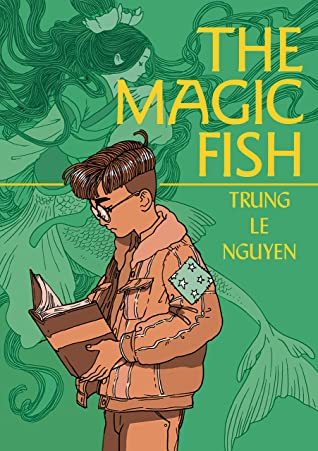


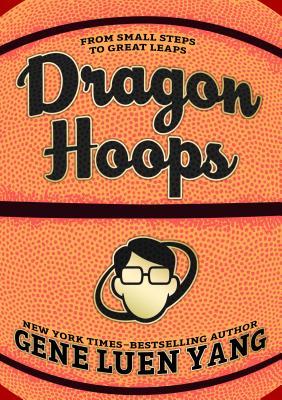
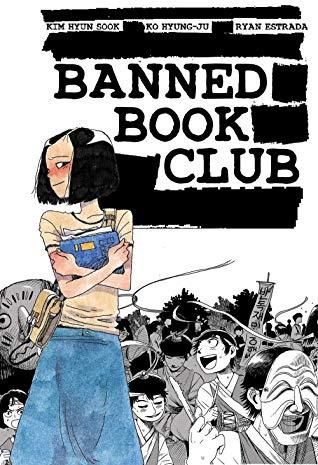

Graphic Recommendations
This year has been an excellent one for readers of graphic novels. I've been reading quite a few during the pandemic when longer form books just seem like too much of a time investment or my attention span is limited. Falling into the visuals can be just the thing I need when the world seems a bit chaotic. Here are a few I highly recommend.
The Magic Fish by Trung Le Nguyen
Random House Graphic
Real life isn’t a fairytale.
But Tiến still enjoys reading his favorite stories with his parents from the books he borrows from the local library. It’s hard enough trying to communicate with your parents as a kid, but for Tiến, he doesn’t even have the right words because his parents are struggling with their English. Is there a Vietnamese word for what he’s going through?
Is there a way to tell them he’s gay?
A beautifully illustrated story by Trung Le Nguyen that follows a young boy as he tries to navigate life through fairytales, an instant classic that shows us how we are all connected. The Magic Fish tackles tough subjects in a way that accessible with readers of all ages, and teaches us that no matter what—we can all have our own happy endings. — Cover image and summary via Goodreads
Displacement by Kiku Hughes
First Second [Jessica's Review]
A teenager is pulled back in time to witness her grandmother’s experiences in World War II-era Japanese internment camps in Displacement, a historical graphic novel from Kiku Hughes.
Kiku is on vacation in San Francisco when suddenly she finds herself displaced to the 1940s Japanese-American internment camp that her late grandmother, Ernestina, was forcibly relocated to during World War II.
These displacements keep occurring until Kiku finds herself “stuck” back in time. Living alongside her young grandmother and other Japanese-American citizens in internment camps, Kiku gets the education she never received in history class. She witnesses the lives of Japanese-Americans who were denied their civil liberties and suffered greatly, but managed to cultivate community and commit acts of resistance in order to survive.
Kiku Hughes weaves a riveting, bittersweet tale that highlights the intergenerational impact and power of memory. — Cover image and summary via Goodreads
Flamer by Mike Curato
Henry Holt and Co.
I know I’m not gay. Gay boys like other boys. I hate boys. They’re mean, and scary, and they’re always destroying something or saying something dumb or both.
I hate that word. Gay. It makes me feel . . . unsafe.
It's the summer between middle school and high school, and Aiden Navarro is away at camp. Everyone's going through changes—but for Aiden, the stakes feel higher. As he navigates friendships, deals with bullies, and spends time with Elias (a boy he can't stop thinking about), he finds himself on a path of self-discovery and acceptance. — Cover image and summary via Goodreads
Dragon Hoops by Gene Luen Yang
First Second
In his latest graphic novel, New York Times bestselling author Gene Luen Yang turns the spotlight on his life, his family, and the high school where he teaches.
Gene understands stories—comic book stories, in particular. Big action. Bigger thrills. And the hero always wins.
But Gene doesn’t get sports. As a kid, his friends called him “Stick” and every basketball game he played ended in pain. He lost interest in basketball long ago, but at the high school where he now teaches, it’s all anyone can talk about. The men’s varsity team, the Dragons, is having a phenomenal season that’s been decades in the making. Each victory brings them closer to their ultimate goal: the California State Championships.
Once Gene gets to know these young all-stars, he realizes that their story is just as thrilling as anything he’s seen on a comic book page. He knows he has to follow this epic to its end. What he doesn’t know yet is that this season is not only going to change the Dragons’s lives, but his own life as well. — Copy image and summary via Goodreads
Banned Book Club by Kim Hyun Sook, Ko Hyung-Ju, Ryan Estrada
Iron Circus Comics [Crystal's review] [Q&A with Kim Hyun Sook & Ryan Estrada]
When Kim Hyun Sook started college in 1983 she was ready for her world to open up. After acing her exams and sort-of convincing her traditional mother that it was a good idea for a woman to go to college, she looked forward to soaking up the ideas of Western Literature far from the drudgery she was promised at her family’s restaurant. But literature class would prove to be just the start of a massive turning point, still focused on reading but with life-or-death stakes she never could have imagined.
This was during South Korea’s Fifth Republic, a military regime that entrenched its power through censorship, torture, and the murder of protestors. In this charged political climate, with Molotov cocktails flying and fellow students disappearing for hours and returning with bruises, Hyun Sook sought refuge in the comfort of books. When the handsome young editor of the school newspaper invited her to his reading group, she expected to pop into the cafeteria to talk about Moby Dick, Hamlet, and The Scarlet Letter. Instead she found herself hiding in a basement as the youngest member of an underground banned book club. And as Hyun Sook soon discovered, in a totalitarian regime, the delights of discovering great works of illicit literature are quickly overshadowed by fear and violence as the walls close in.
In Banned Book Club, Hyun Sook shares a dramatic true story of political division, fear-mongering, anti-intellectualism, the death of democratic institutions, and the relentless rebellion of reading. — Cover image and summary via Goodreads
Almost American Girl by Robin Ha
Balzer + Bray
A powerful and timely teen graphic novel memoir—perfect for fans of American Born Chinese and Hey, Kiddo—about a Korean-born, non-English-speaking girl who is abruptly transplanted from Seoul to Huntsville, Alabama, and struggles with extreme culture shock and isolation, until she discovers her passion for comic arts.
For as long as she can remember, it’s been Robin and her mom against the world. Growing up in the 1990s as the only child of a single mother in Seoul, Korea, wasn’t always easy, but it has bonded them fiercely together.
So when a vacation to visit friends in Huntsville, Alabama, unexpectedly becomes a permanent relocation—following her mother’s announcement that she’s getting married—Robin is devastated. Overnight, her life changes. She is dropped into a new school where she doesn’t understand the language and struggles to keep up. She is completely cut off from her friends at home and has no access to her beloved comics. At home, she doesn’t fit in with her new stepfamily. And worst of all, she is furious with the one person she is closest to—her mother.
Then one day Robin’s mother enrolls her in a local comic drawing class, which opens the window to a future Robin could never have imagined. — Cover image and summary via Goodreads
For a few older titles, you can check out the lists we've created in the past:
LGBTQ POC Comics
3 Quick Comic Book Reads
Women's History Month
Getting Graphic
19 notes
·
View notes
Text
Reading recommendation (and a brief meditation on the utility of Frank Wilderson)
I’ve read an awful lot of self-styled “afropessimistic” theory. I’ve been wanting to write about it for some time. But there are significant hurdles. First off, I’d need to read a lot more if I wanted to engage with it in a scholarly sense, and reading it is a very painful chore. The effort required would necessitate a greater reward than the mild serotonin boost of a successful blog post, yet attaching my own name and affiliation to any critique would open me up to vicious reprisal, mostly from people who have not read any of the works being discussed. I mean, come on... Look at the term: afropessimism. It can hardly be uttered aloud among the uninitiated, you have to explain that you’re not trying to dismiss an intellectual movement, that this is what these writers actually call themselves.
Long story short, I highly recommend this new piece from the LA Review of Books: “On Afropessimism,” by Jesse McCarthy. It’s a longform review of a new book by the man who coined the term, Frank Wilderson, titled simply Afropessimism.
I didn't come to Wilderson until long after reading Frantz Fannon, Derrick Bell, and Cornell West. These are all relatively fatalistic theorists who regard being black (or "blackness") as necessarily existing in a state of alterity, one that was perhaps inalterable, but they nonetheless did not regard themselves as fundamentally inhuman. Nor did they argue that reform is impossible (hence the “pessimism”) and that therefore inaction was the only viable approach to praxis. I've never read Orlando Patterson (the other foundational theorist cited in the by McCarthy), but this passage resonates strongly
Racial exceptionalism, political immutability, “antiblackness” as structural antagonism, and abjection in the form of “social death”: each of these concepts predates Afropessimism, and as I see it, together they form its foundation. Indeed, it is the synthesis of all of these ideas into one purportedly coherent worldview that I take to be the innovation of Afropessimism. I have deliberately chosen the writers, scholars, and thinkers cited above, however, precisely because they do not come to the same conclusions as Wilderson. Several could be said to be strongly opposed; even Derrick Bell (whom Wilderson might have suggested as a predecessor but does not cite in Afropessimism) ultimately counsels in his book’s epilogue that we move “beyond despair” and calls on us to “fashion a philosophy that both matches the unique dangers we face and enables us to recognize in those dangers opportunities for committed living and humane service.” Part of my point here is that those who disagree with the Afropessimist worldview cannot be simply dismissed as “soft” or naïve. Nor should anyone infer that simply because one critiques the Afropessimist synthesis, one cannot also hold strong views in agreement about any number of more specific points of analysis.
This has been one of the more striking aspects of the afropessimism becoming ascendant in mainstream anti-racism (aside from the fact that it's only rarely acknowledged as the intellectual base of the movement)--the belief that even people who take an aggressively dim view of race relations can still be dismissed as naive, or even as actively white supremacist, simply for suggesting that some degree of reform is desirable.
The description of Wilderson's work contained within McCarthy’s review gives us a glimpse into how such dismissal became normalized: a combination of utter self-assuredness and the ability to assert complete moral parallels between acts and situations that few sane people, prior to 2017, would have considered equivalent:
For many of us, such a leap is neither ethical nor comprehensible. But for Wilderson the portability and paradoxical fungibility of slavery fits perfectly with his interest in film and his Lacanian and Fanonian readings of it. How else to explain passages in Afropessimism in which incidents involving a terrible white roommate situation he and his girlfriend find themselves in circa 1979 are, for Wilderson, obviously comparable to Steve McQueen’s 2013 film, 12 Years a Slave, which was based on Solomon Northup’s 1853 slave narrative. This is not a jest, but a sustained and intensely explored analogy, in which the whipping of Patsey (played by Lupita Nyong’o in the film), descriptions of the cool sadism of Mary Epps (the slaveowner’s wife) from Northrup’s 1853 narrative, and Wilderson’s troubles with a batty white roommate all share the same stage. We are asked to imagine them as coequal and even coeval psychological theaters of cruelty, whose mise-en-scène simply involves different props. The plantation is everywhere and all the time. It is ontological, which means that it attaches trans-historically to all Black persons regardless of their social position.
How far does this go? In his academic monograph on film studies, Red, White & Black (2010), Wilderson forthrightly asserts that Black academics are not subalterns in the academy but “Slaves of their colleagues.” Is being talked down to in the faculty lounge really the same as being whipped at the post, or slinging rock on the corner, or being placed in solitary on Rikers Island as a juvenile? Is working at Merrill Lynch in New York as a Black woman really the same as working shifts as a Black gay man in a McDonald’s in Alabama? Is it ethical or desirable to confound all of these into a tortuous equivalency while telling those who propose to fight at your side to shut up because you don’t like the analogies they are using to connect themselves with your suffering?
For a long while I've been trying to argue that what we now regard as wokeness, at least in its present and culturally dominant state, has borrowed its means of comportment--if not its fundamental worldview--from afropessimism. This combination of hectoring paranoia and cocksure self-righteousness is now the norm in liberal spaces, even (maybe especially) among people who have no rational claim to especial victimhood.
Key to this is Wilderson’s assertion that blackness is not only an inescapable reality structuring all human existence, but that as such, it means that black people are fundamentally inhuman. Not just an exempted or subaltern class: a different conceptual entity altogether:
It is fair to ask of a [critical] “lens” whether it actually sharpens our view and, if so, to perform demonstrations of clarity? A major problem for Afropessimism is that its claim to revealing the underlying structural truth seems to repeatedly require abandoning any significant contact with historical reality. With social categories like class, gender, and material facts made irrelevant, the theoretical work is forced to concentrate itself in rhetorical aphorisms that seem to be slouching their way toward slogans. “The antagonist of the worker is the capitalist. The antagonist of the Native is the settler. But the antagonist of the Black is the Human being,” Wilderson tells us. The problem with this, apart from its faux-syllogistic form, is that human identities are not fixed and rigid boxes, but dynamic rings of change that merge and overlap. The Black Americans involved in the colonization scheme of Liberia in the 19th century were both Black (formerly enslaved on US plantations) and also settlers. Obviously, there are Black capitalists just as there are Black workers. Is there a double-jeopardy principle for antagonisms or some calculus by which they can be selectively negated?
Regarding oneself as inhuman means that you simply cannot win, even while you're winning. It means, also, that you get to exempt yourself from the rules of human interaction that are otherwise universal. Your statements and beliefs cannot be subject to any means of adjudication, since by your own self-understanding you will never be validated, which means in a bizarre turn of logic that your validity is inevitable. Your immorality is always assumed, which means your morality can never be put into question. Nothing you do or say can ever be considered bad or incorrect, because you believe yourself to have been exempted from such abstractions, that the only possible judge of yourself is therefore yourself. This is a tremendously inviting mode of comportment to both paranoid neurotics and mediocre intellects, which goes a long way in explaining how it became so popular so quickly.
32 notes
·
View notes
Text
Light at the End of Doubt’s Tunnel
Note: This was written a year or two ago. For those who would like to hear the full story of how I processed and finally was freed from intellectual doubt, together with the major things that caused me trouble and how I realized that there were good solutions to them- as well as amazingly powerful reasons to believe in Christianity, here's part 1 of a 5 part series.
I struggled with doubt for years. It was extremely painful. I'll turn 26 in a couple of days. My doubt began when I was 13, embraced evolution (that actually didn't start my period of doubting, I was theistic evolutionist for a long time, until 2014) and found the atheist community online. It was devastating. I had never thought about why I believed what I believed. I encountered a huge variety of arguments, and I was clueless about how to respond to any of them. I was overwhelmed, I was miserable, I felt myself pushed towards the inevitably conclusion that atheism was true. They have taken my Lord away from me, and I do not know where they have laid Him. I cried out to God, I wept, I begged. And nothing. Radio silence. It was the most emotionally intense period in my life, and I couldn't talk to anyone. I didn't want to say I was doubting. I knew it would crush my mom. I was alone.
I remembered one day that there was a book on the shelf- Lee Strobel's The Case for Christ. I devoured it in a day. It didn't answer all of my questions or put an end to my crisis of faith. What it did do is give me a lifeline, something to cling to, something to hold on as I kept searching and praying for answers.
I'm not going to tell you the whole story. What I will tell you is that over the next seven years, every single doubt I had was answered in a way that completely satisfied me intellectually. I cannot deal with cognitive dissonance. I have to look up critical reviews of any book whose thesis I want to believe. I don't say that to brag or to say anything about myself except that for me, I needed intellectual satisfaction. My name is Thomas, so I guess like Thomas, even though it would have been better for me to fully trust Him from day one, He offered the scars of the nails in His hands to me. Over the years I would continue to encounter newer and more sophisticated challenges to Christianity and Biblical faith. I went through another major crisis of faith in 2013, this time really struggling with issues of higher criticism and the Old Testament. On Easter of that year that crisis ended. I continued to struggle with doubt on and off until April 2014. From April-October of that year, my entire worldview was radically reconfigured. I realized that the Bible was more true than I had ever dared to believe. I realized that there were excellent answers to each criticism that had plagued me. I realized that the academy really wasn't all it was cracked up to be.
That last one was important. I had to internalize the fact that sometimes almost everybody in a particular discipline believes things that are simply foolish. My dad has a Ph.D. I'm in my final semesters of a Masters program and intend, God-willing (please pray for this) to get a Ph.D. So I respect the importance of study and reflection. I am not anti-intellectual. But the academy in its secular incarnation is foolish. We say sometimes that a biblical fool does not mean an idiot. Quite frankly. that is basically what it means, only moreso. And I have realized that many people who have IQs believe idiotic things and make idiotic arguments. I realized that when you acknowledge that you don't have to reverently assume that a critique that seems obvious to you is simply "too obvious" and that you must be missing something. You likely aren't. Remember- the most serious problem in academic literature is not the data. It's logic. The fact that atheists are bad philosophers isn't something that just has implications for their writing on philosophy. It means that they are untrained thinkers, unused to rigorously testing each conclusion for its logical validity in relation to the premises, and are used to relying on hunches without knowing it. This kind of thing is present throughout everything Dawkins and Krauss write and say. You think it doesn't affect their scientific work? You bet it does. Difference is that there aren't logicians and philosophers there to call them on it.
Anyway. I wanted to write that in case any of you were struggling with crises of faith. I know how deeply, deeply painful and intense it can be. In many ways there is simply nothing like that. In that light, this is one of my favorite texts:
(2 Corinthians 1:3-7) Blessed be the God and Father of our Lord Jesus Christ, the Father of mercies and God of all comfort, who comforts us in all our affliction, so that we may be able to comfort those who are in any affliction, with the comfort with which we ourselves are comforted by God. For as we share abundantly in Christ's sufferings, so through Christ we share abundantly in comfort too. If we are afflicted, it is for your comfort and salvation; and if we are comforted, it is for your comfort, which you experience when you patiently endure the same sufferings that we suffer. Our hope for you is unshaken, for we know that as you share in our sufferings, you will also share in our comfort.
If you are struggling, please feel free to message me. I am very willing to help you work through your issues with anything I can offer.
12 notes
·
View notes